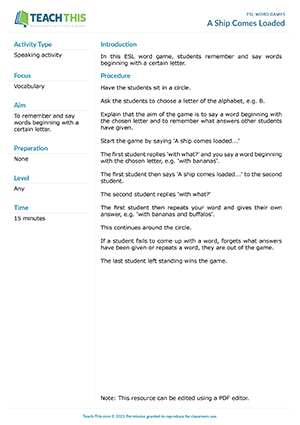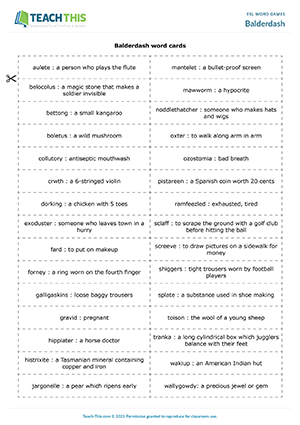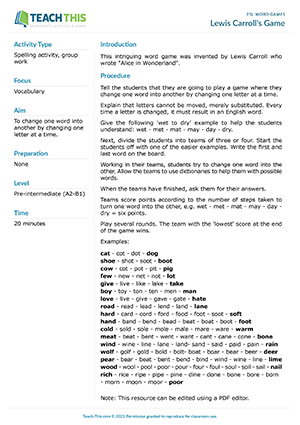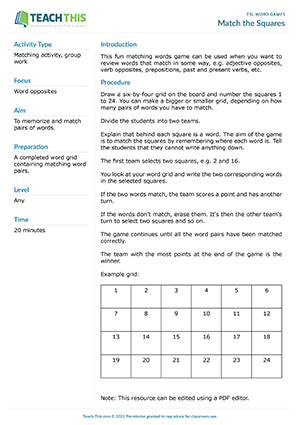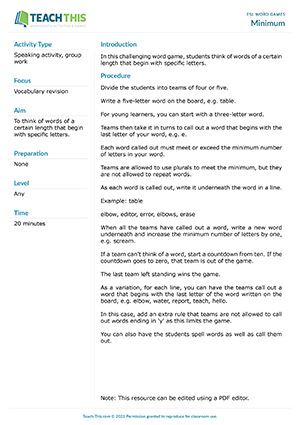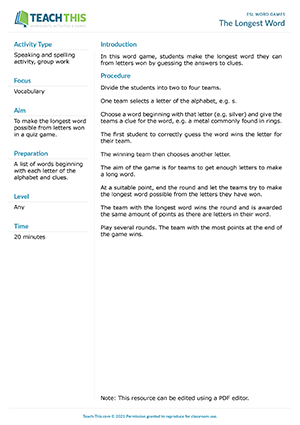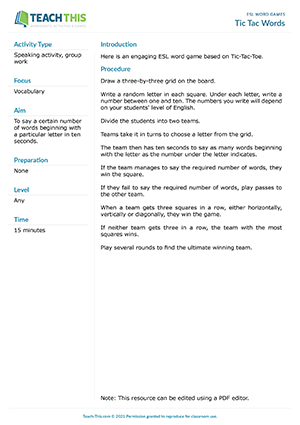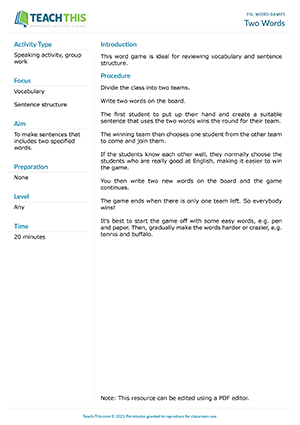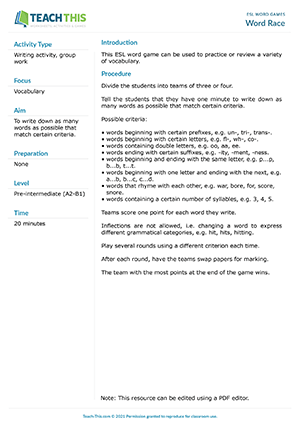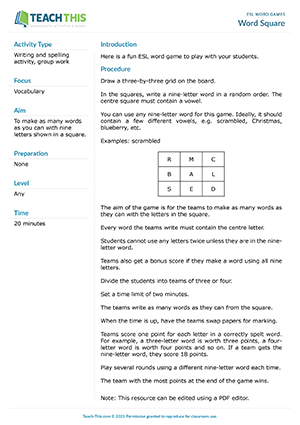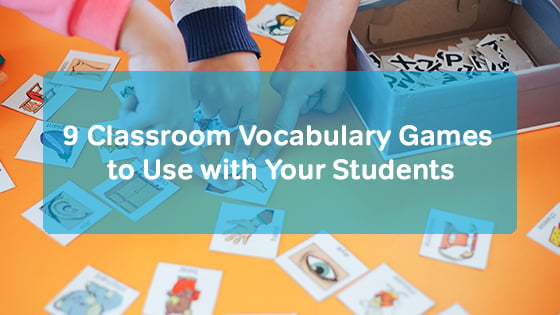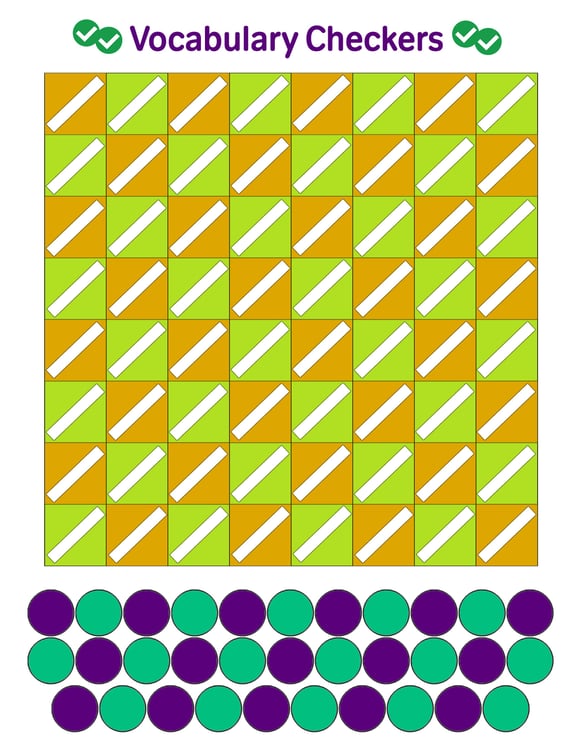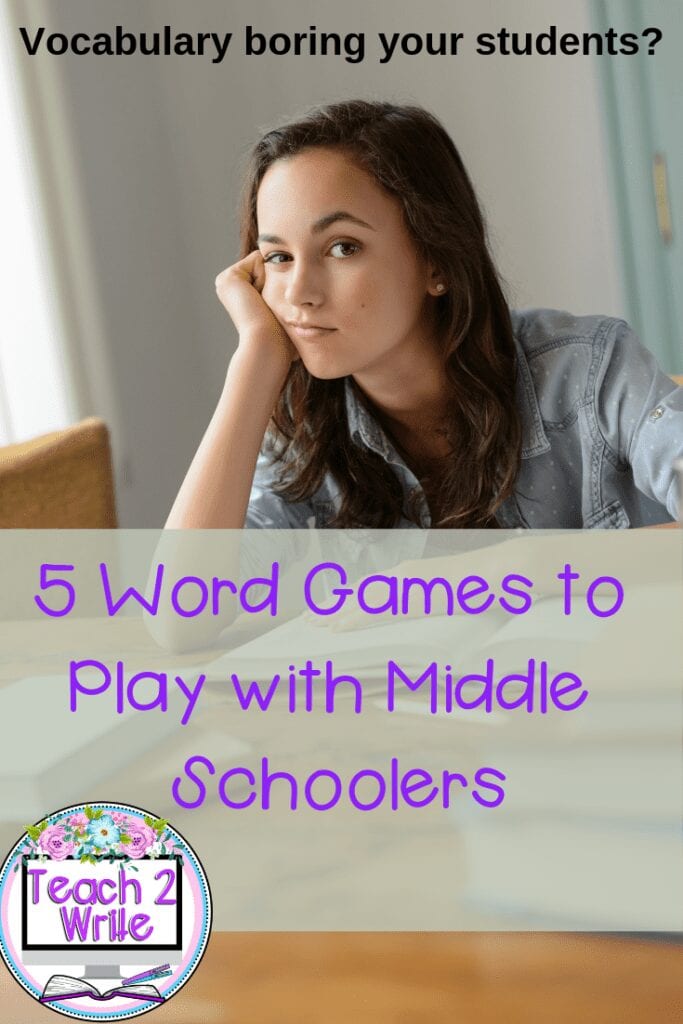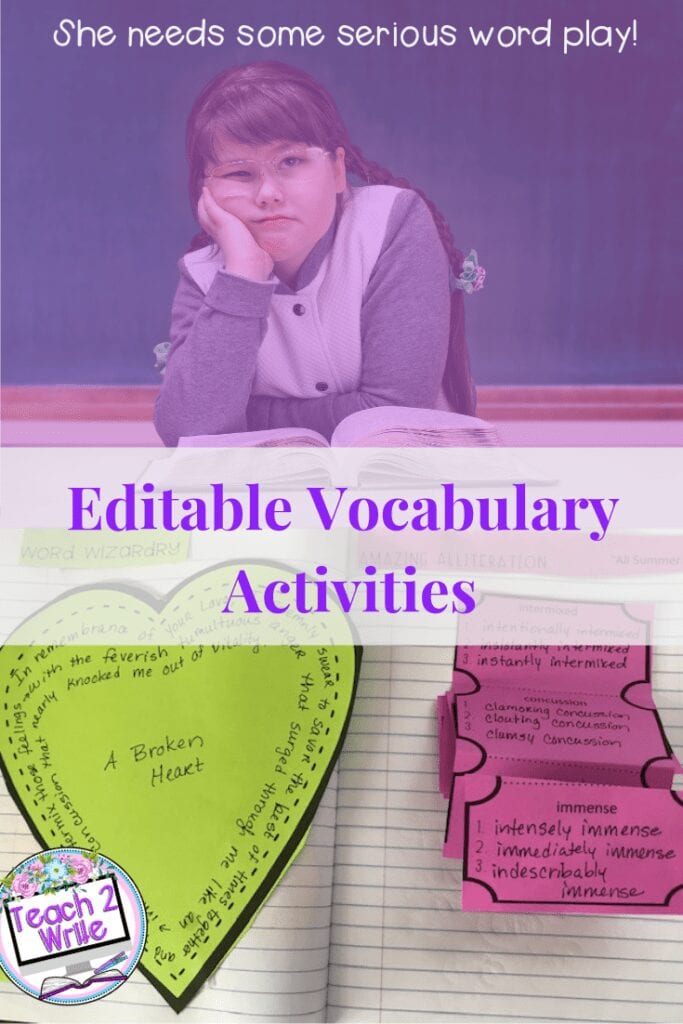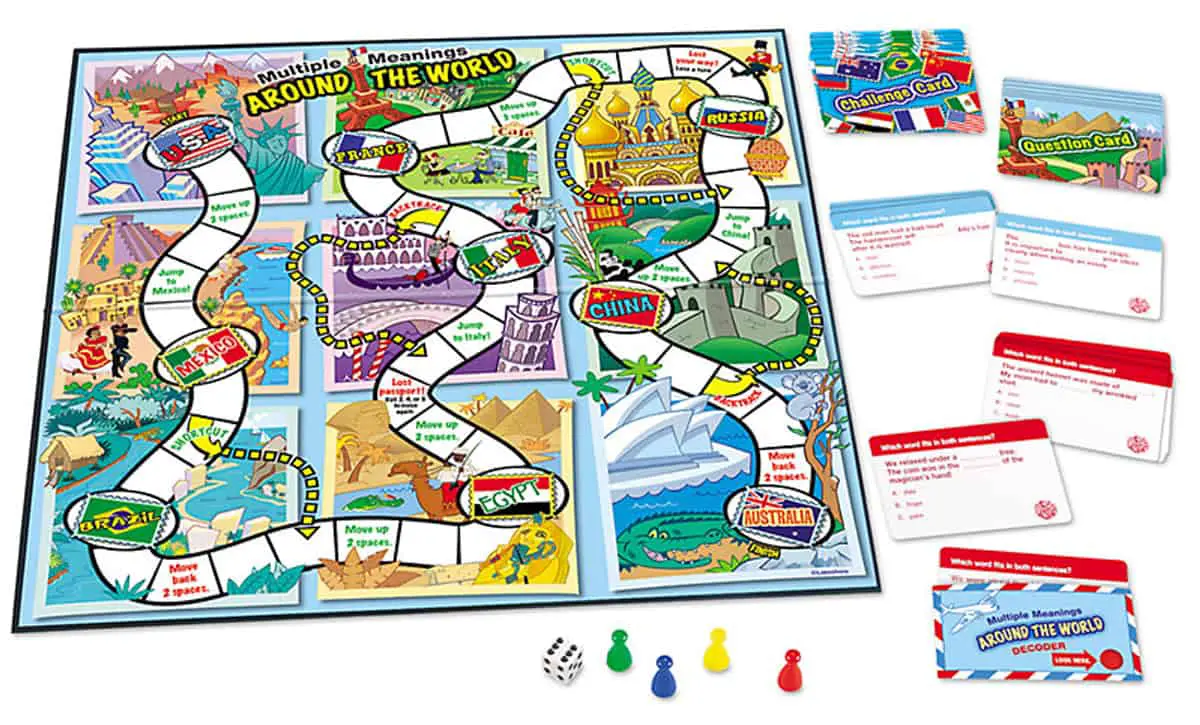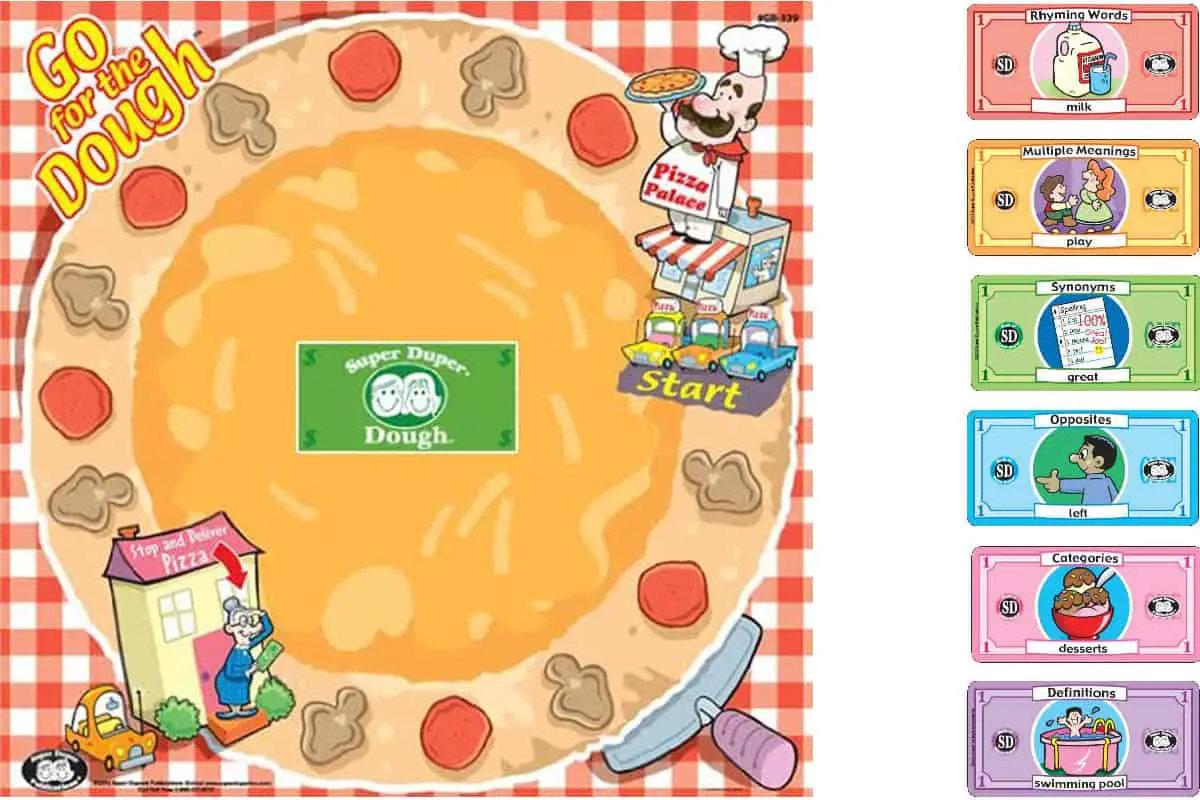These word board games are an excellent way to build up your middle schooler’s vocabulary. They’re educational board games for teenagers.
As teens get ready for high school, it’s important that they have strong language skills, both reading and writing. That means during the middle school years, they should spend time improving their spelling and vocabulary skills.
Instead of relying on a large curriculum or boring worksheets to help your teens further develop their word building skills, play some of these board games instead. They’re a great way to work on language arts.
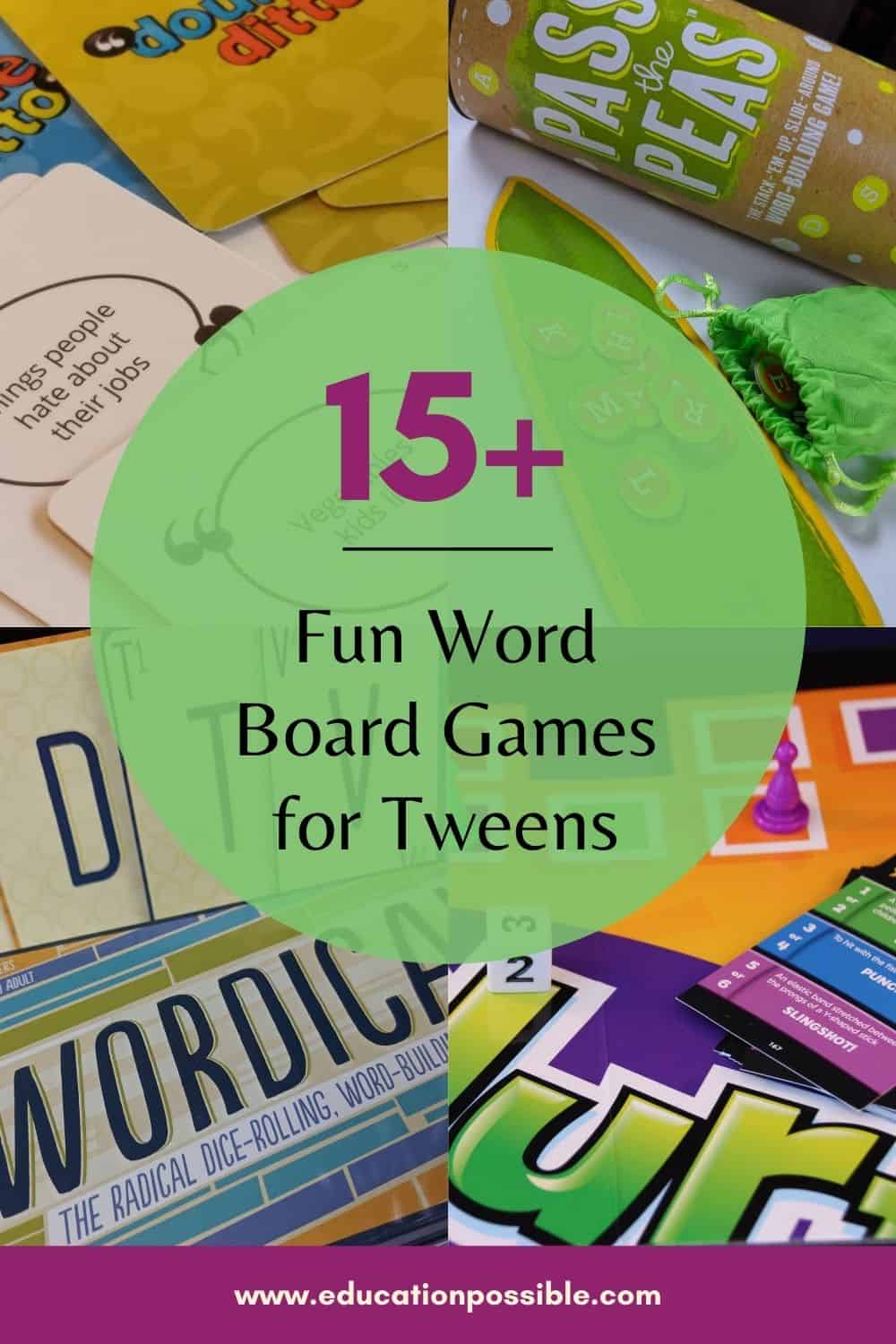
When middle schoolers play these vocabulary word games, they’re not just sitting there answering questions and spouting memorized facts. They’re playing with words and being creative.
Fun language arts games help teens get comfortable with spelling, vocabulary, and building words. All of which improve their reading and writing skills.
Personally, I think the days of giving kids long lists of words to memorize for spelling and vocabulary are long gone.
Tweens learn better when they’re immersed in a subject instead of just retaining facts.
One way to engage your homeschooler in language is to play games specifically designed for word building. As they play, they’ll be shoring up their spelling skills, building their vocabulary and improving their reading skills, all while having some fun.
Board games also have an element of friendly competition built in, so your older kids will be busy trying to beat you and each other, and they’ll probably forget they’re actually learning.
Not only are these word games perfect for language arts class, they’re so enjoyable that they make great additions to your family game night.
The ultimate goal is to raise kids who can communicate effectively, whether written or verbally, so I’m all for using whatever tools work to accomplish this.
These board games and card games are fun to play and excellent tools to add to your language arts plans.
How to Use Board Games in the Classroom
So how can you incorporate board games like these into your classroom or homeschool? It’s actually easier than you think!
- Set aside your language arts curriculum for the day (especially any spelling or vocabulary plans) and play a game instead.
- Transform a standard game by using the facts you’re teaching as the clues.
- Play a word game during lunch. It’s simple to pull out one of these games while you’re sitting at the table eating, and it won’t take any time away from your school day.
- When kids finish their work early or after you give a test, use a word game as a reward.
- If you usually take a day off during the week or have one where your teen has a lighter course load, take an hour to play a game or two.
- Add these word board games to your next family game night. Everyone can benefit from expanding and strengthening their vocabulary. Plus, tweens will love trying to beat you in a word game.
Use games with small groups, individual play, or as a fun activity for the family.
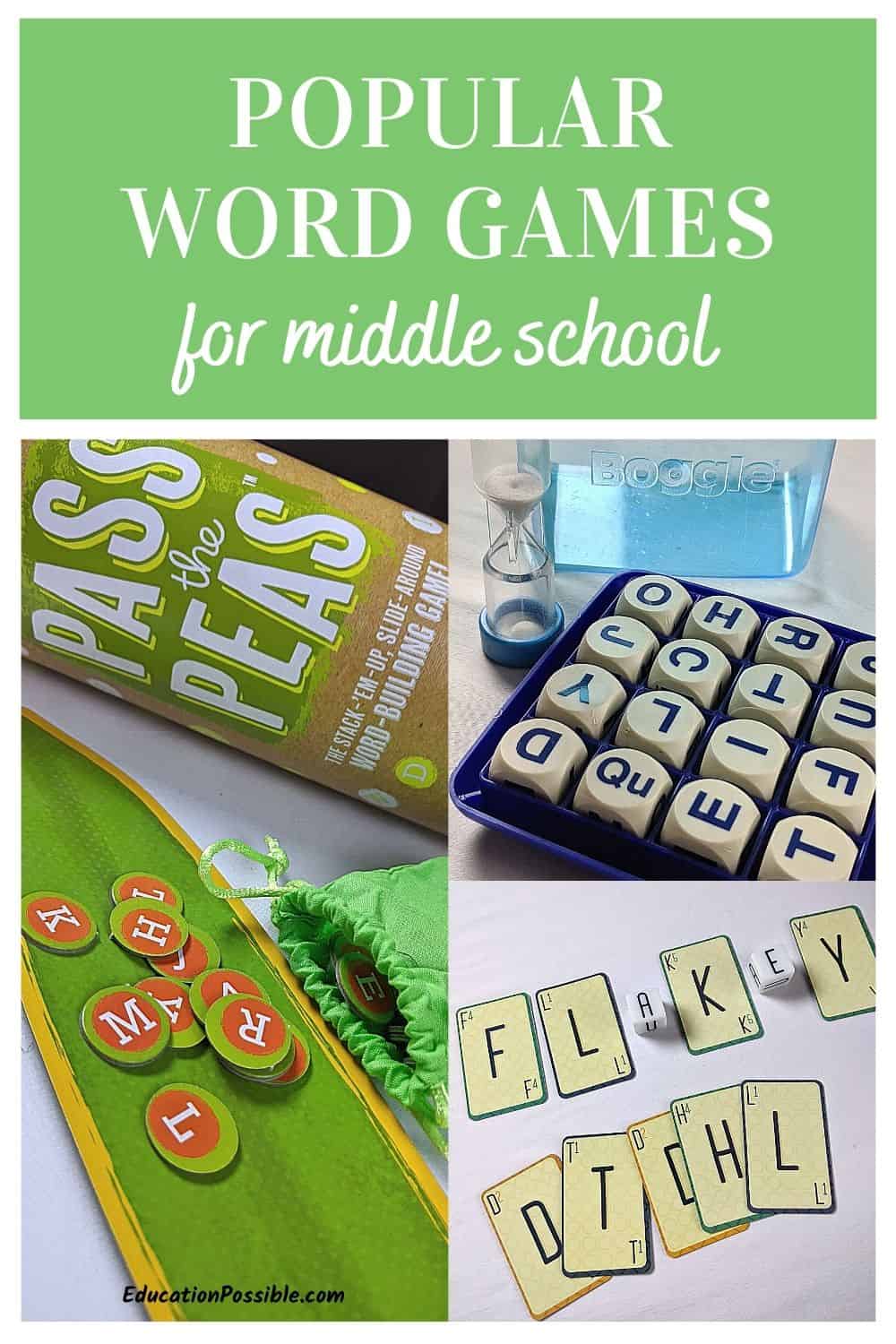
Any links in this post may be affiliate links. See my disclosure statement.
MORE LANGUAGE ARTS ACTIVITIES
Aside from word games, there are plenty of fun activities you can use to build the vocabulary of older children.
- Improve creative writing skills with Story Builders.
- Printable word games.
- Teach writing to teens with dysgraphia.
- These word tools will build confidence.
This is one of our favorite word games. Players race to write down two words that fit the category on the card, and if they match another player’s answer, they both earn points.
It’s an awesome family game.
You play this game with two stacks of cards — category cards and letter cards.
The top card on the category pile is turned over first. As soon as a letter card is flipped, players rush to be the first person to shout out something that fits the category and starts with the letter.
Players race to be the first one to find the word that hides in the letter spiral.
Sounds easy, but it can be quite challenging to find where the word begins and ends when you’re scrambling to beat your opponent.
Scattergories is a classic game that helps build vocabulary words.
Players start the round with a category list. Once the letter die is tossed, they must rush to write as many words as they can that fit the category and start with the chosen letter.
You need to be quick to finish before the time limit. But only unique answers count, so you’ll have to use your vocabulary to win.
As players move around the board, they try to guess the correct vocabulary word from the definition card.
If they give the wrong word, the other players have time to answer.
This game puts a unique twist on the classic crossword puzzle game.
Players try to score the most points by creating words, but they have the added choice of adding their letters on top of other ones.
The higher the pile, the more points players earn.
This game is played with 8 stacks of cards in the middle. When it’s your turn, you choose any of the top cards and create a word. The next player does the same, but then can use the remaining letters to play on your word.
Play continues until you use all the cards.
This is another game that’s played with category cards and letter cards.
However, with this game, when the cards are turned over, players try to be the last one to shout out a word that starts with the letter and matches the category.
The timer is random, so you never know when the time will end.
Players spin the spinner to determine the two letters and category for each round. Then, players race to write as many words as possible that start with one letter and contain the other and also fit the category.
Scrabble is a classic word game that’s still an excellent tool for building everyone’s spelling and vocabulary skills.
Players use their chosen tiles to make words, while trying to get the highest score possible.
This is a fun game to play and is incredibly portable, thanks to the handy banana pouch.
There are lots of variations on the gameplay of Bananagrams, so you’ll never get bored playing. In the classic play, players use their tiles to make words in a crossword-style form.
Boggle is a fun sight word game that’s been around for years.
Players put the lid on and shake the letter dice. Once they settle, start the timer and try to find as many simple words in the letters as you can.
Write them down on a piece of paper before time runs out.
Players are given 20 tiles, and a 5 tiered holder to begin.
When someone says go, everyone races to build 5 different words with their tiles and place them in the slots on the plastic holder.
As soon as someone builds their words, they shout, Dabble, and the round ends.
This vocabulary game includes 108 consonant cards and 2 vowel dice.
Players roll the vowel dice and use them with the consonant cards in their hand to build the highest scoring word.
This is a cute game that will definitely challenge tweens.
You give all players a paper pod and colored letters. When the timer begins, they use their letters to build a word on the pod. Then, they give the pod to the next player and the next round begins.
Now players use the word in front of them and their remaining letters to build a new word.
When your pod gets back around to you, you count the number of letters in your color and that’s your score for the round.
This game will definitely get your tween’s creative juices flowing.
There are 9 dice with pictures on each side. To begin, a player rolls the dice and tells a story, trying to include as many of the pictures as possible.
This is a great game to take along to parties or on a family trip.
There are a bunch of other dice/picture variations you can choose from too.
Here’s how we use Story Cubes in our homeschool.
Hopefully, you’ve seen how easy it is to help your teens build their language arts skills through games. Plus, they’re a lot of fun for middle school students!
Remember that your vocabulary is like a muscle. The more you use it and work it, the stronger it gets. And word board games are a good way to get older kids excited about English language arts.
Don’t let tweens just sit there answering questions and spouting memorized facts. Take some time to play these word games in your homeschool and watch how quickly everyone’s language improves.
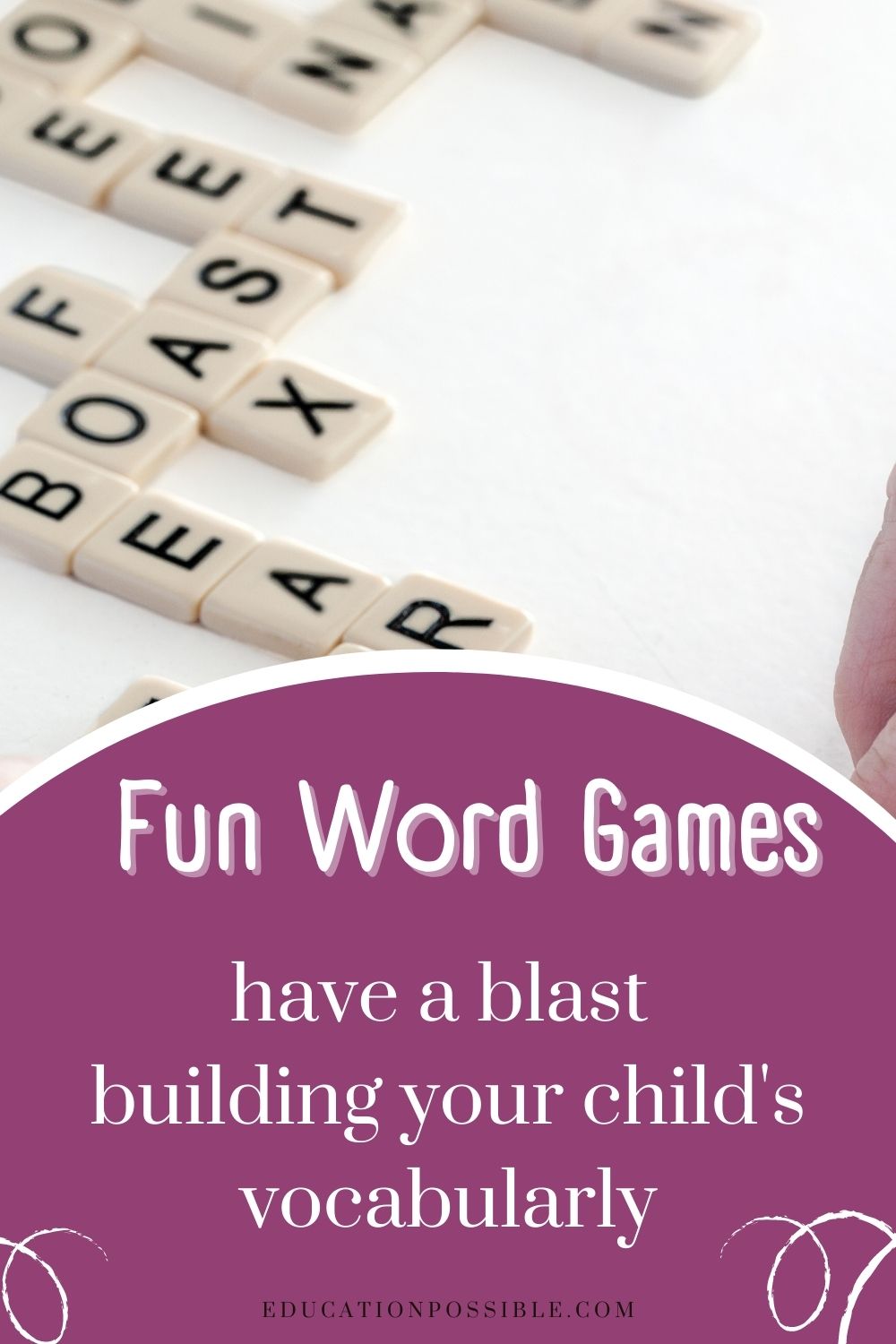
WHAT’S YOUR FAVORITE WORD Board GAME?
- Bio
- Latest Posts
I love homeschooling! Learning is a way of life for our family. Most days you will find us exploring our Central Florida community, having fun while learning. I am constantly looking for new and interactive ways to engage my older children.
The acquisition of new vocabulary is essential in terms of overall language advancement. However, there is always a need to review active words from time to time in order to use them fluently in speech. Here, we will present a couple of great vocabulary revision games which will perk up every classroom. Through these games the learners will feel how fun, entertaining and effective the learning process can be.
1. Charades
Charades is a fun and cool revision game. Students need to practice their acting skills to explain the words. This game is extremely easy to organize with minimal advance preparation. The only thing to be ready for is to keep a collection of vocabulary cards for the words you have studied.
The class is divided into two teams. Each team member takes turns acting out one of the words from the vocabulary set and explains it by acting out the word. If his or her own team can’t guess the word, the opposite team gets the chance to guess it. Each right answer equals one point.
Skyeng ищет преподавателей английского. Подробности по ссылке: Skyeng
2. Pictionary
Pictionary is also an entertaining game to play for vocabulary review. The rules are similar to those of charades except that instead of acting out the word, it is drawn on the board.
3. Bingo
Bingo can serve as a good revision game. From my experience, most of the groups/students like playing bingo because it gives them the chance to reflect on the words they have digested.
Students are given a blank bingo board and are asked to put the review words into the squares randomly. The teacher puts the active words in a hat or a box, takes them out one by one and defines them. If the student has a word corresponding to the definition, he crosses it out on his bingo board. When someone gets five squares in a row, they should shout, “Bingo!”
Check these articles out as well:
4. A memory style
A memory style card game can be another effective way for reviewing vocabulary. It requires some preparation before the game starts. For each word to be reviewed, one card should have the target vocabulary word and another card should have the definition of the word. You also need to have a big playing grid where you put the words and their definitions face down.
Each person turns over two cards each turn trying to find a match. If the cards do not match, he turns them over again and the next person tries to find a match. If he succeeds, he keeps the cards and gets an additional turn. The player with the highest number of cards at the end of the game wins.
The game can be modified even further. If you have accumulated enough synonyms or antonyms to the target vocabulary, you can practice matching target words to their antonyms or synonyms.
5. Categories
Categories is another awesome revision game which will make students energized and empowered. What they need for the game is to draw 4-6 columns on their paper and write a category at the top of each column. Categories fit the topics covered during the course. For example, if you have covered the business topics of Marketing, Work and Leisure, Ethics, Human Resources, Travel, you write these topics as categories.
You time the students and ask them to write as many words as possible under each category. As a further modification, choose a random letter and write it on the board. Give students enough time to write down a word for each category that starts with that letter.
Экономьте время на подготовку к урокам и проверку домашних заданий со Skyeng. Удаленный формат занятий, защита от внезапных отмен и график, который настроен специально под вас. Присоединяйтесь к нашей команде. Подробности по ссылке: Skyeng
6. Letter scramble
Letter scramble will make students really competitive and super fast. What you need is to take a list of words that your students have recently learned and write a scrambled version of each on the board. Students need to unscramble the words on their paper. The first one to finish deciphering all the words wins.
7. Stop the bus
Stop the bus is a cool game my students adore. I usually divide the class into 2-3 teams. One student from each team. This student sits on a chair facing his peers. Then from behind the student in the hot seat, show the other students a word from the lesson. The other students must try to describe what the word is without saying the actual word. And the student in the hot seat must guess.
The student who guesses the word shouts out “stop the bus” and checks the word with the teacher. If correct, the team gets a point. If wrong, other teams have the chance to guess the word by writing their versions on a piece of paper and passing the papers to the teacher.
8. Puzzles
Puzzles is another cool and easy tool to review the material in an effective way. What I like about this way of vocabulary revision is that students can work in pairs or groups while trying to find words matching the definition in the crosswords. They learn by listening to each other, cooperating to find the right answer. In this way, they both review the material and improve their teamwork skills.
Follow this link to get templates of different types of puzzles.
We also recommend watching a video with Alexei Konobeev. The speaker shared games to help your students remember new vocabulary. These games do not require special training and you can adapt them to any age and level.
We hope that all these games would serve their best to liven your vocabulary revision sessions and make them more meaningful and effective.
Which of these games have you tried? Which ones have you picked up for your next revision slot?
With so many digital games available, there are many that can be useful for student learning. While I don’t want to promote more screen time than many kids already have, there is a time and a place for it. Many of the games you’ll find on this list will work for early finishers, homework, or stations. Some are even good to use as everyday activities to warm up at the beginning of class. No matter how you chose to implement these, they will engage students.
1. Sight Word Bingo
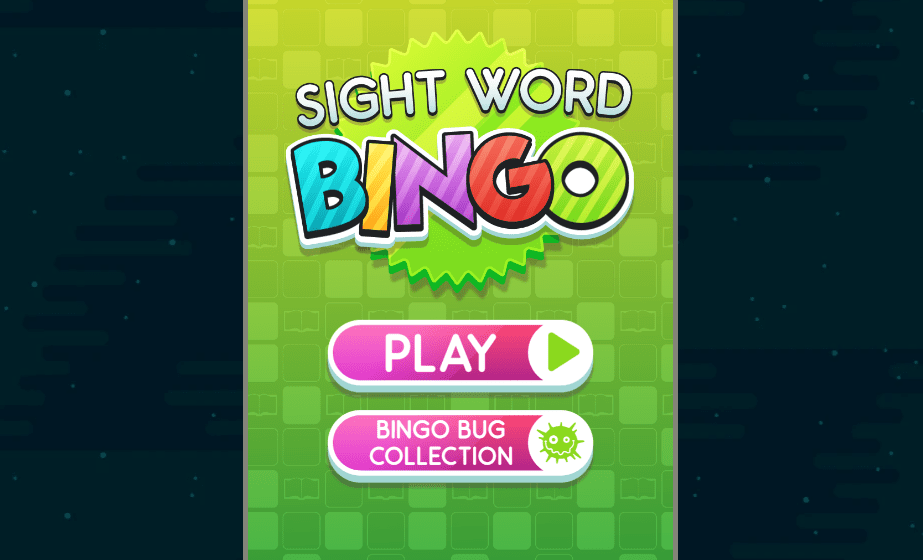
ABCya is a favorite educational site for kids and this game is a blast. It uses Dolce sight words, kids have to find the words on their bingo board and then get 5 in a row! Who doesn’t love Bingo?
Learn More: ABCYA
2. Sight Word Smash
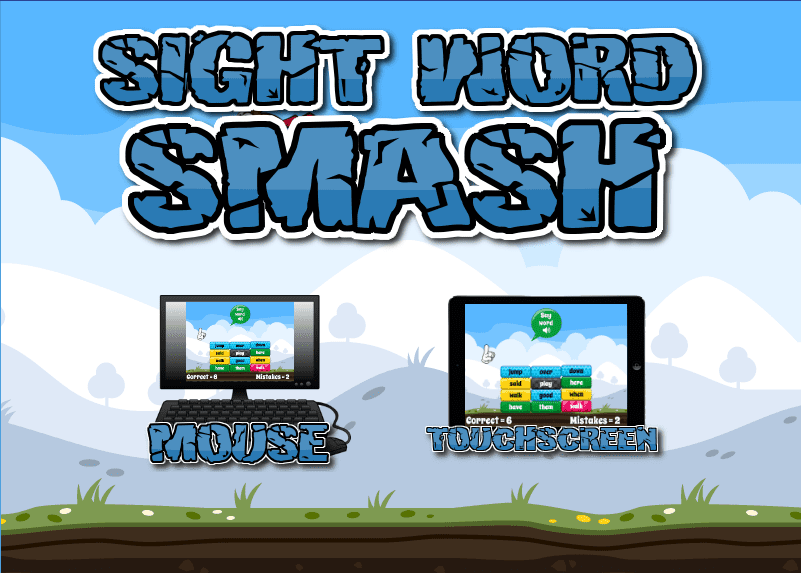
Listen for the words then smash the blocks. If you get it wrong, then another block is added to the top. Once it hits the top, the game ends. I can see one engrossing kid to the point that they’d forget it is educational.
Learn More: Room Recess
3. Sight Word Memory

Memory games have been around for decades, so this online game is a no-brainer for sight words. I remember playing memory when I was a kid, which proves that it’s an effective game for kids to play as well.
Learn More: Cookie
4. Kitten Hop

Cute kittens help school-age children learn their Dolce sight words. Race against other kittens by identifying the words said aloud. That sounds like fun to me. It is so important for kids to have a time limit when practicing their sight words, once they know enough of them.
Learn More: Arcademics
5. Online Boggle
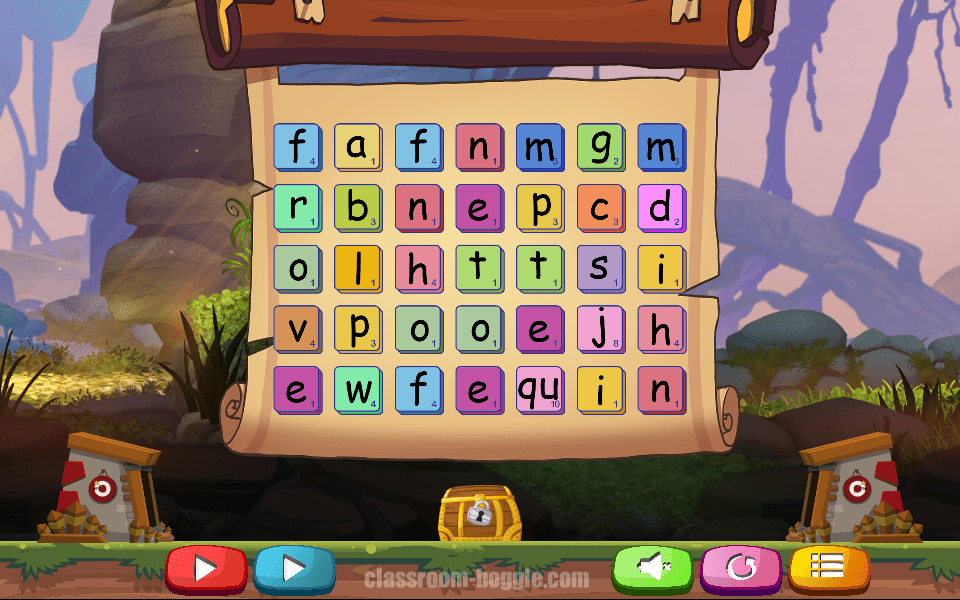
Boggle is a great spelling adventure for school-age children and this online version makes it even better. It eliminates the noise and saves paper for your responses, as well as checks to make sure that the words you create are usable all in one spot.
Learn More: Classroom Boggle
6. Digital I Spy
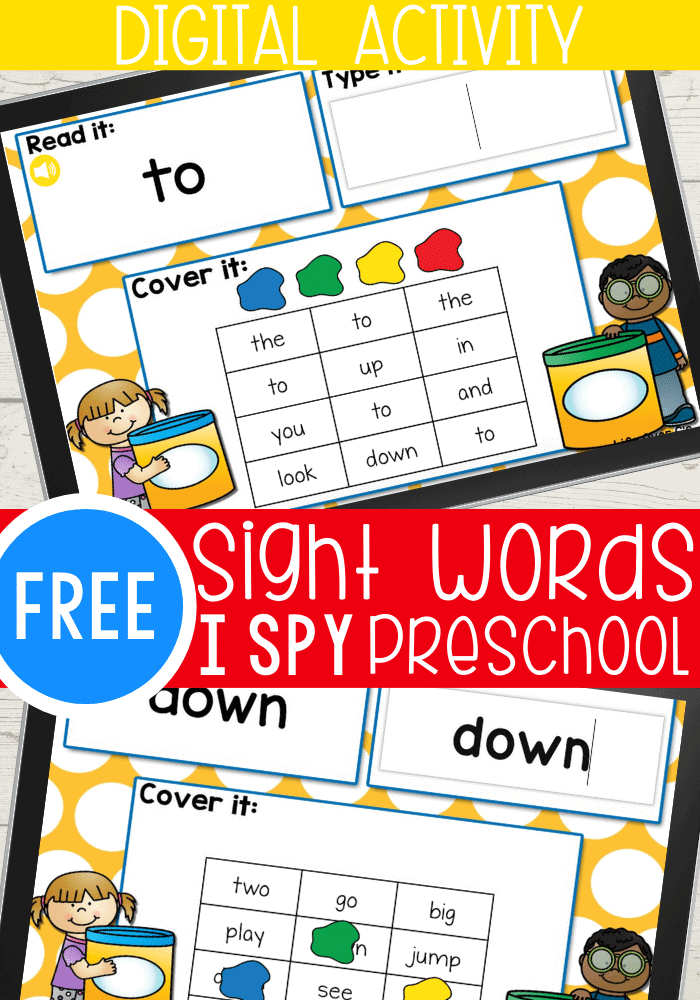
I Spy, an old-fashioned word game, gone digital. Learning sight words gives kids confidence and makes them feel like they can read. This game does just that and it’s done in a way that makes kids feel like it’s not learning at all.
Learn More: I Teach Too
7. Word Crush

This game is created using Google Slides or Powerpoint, making it perfect for virtual learning. It’s a standards-based game that helps kids practice phonics and can be customized to what skills you are currently working on.
Learn More: Teachers Pay Teachers
8. Vowel Teams
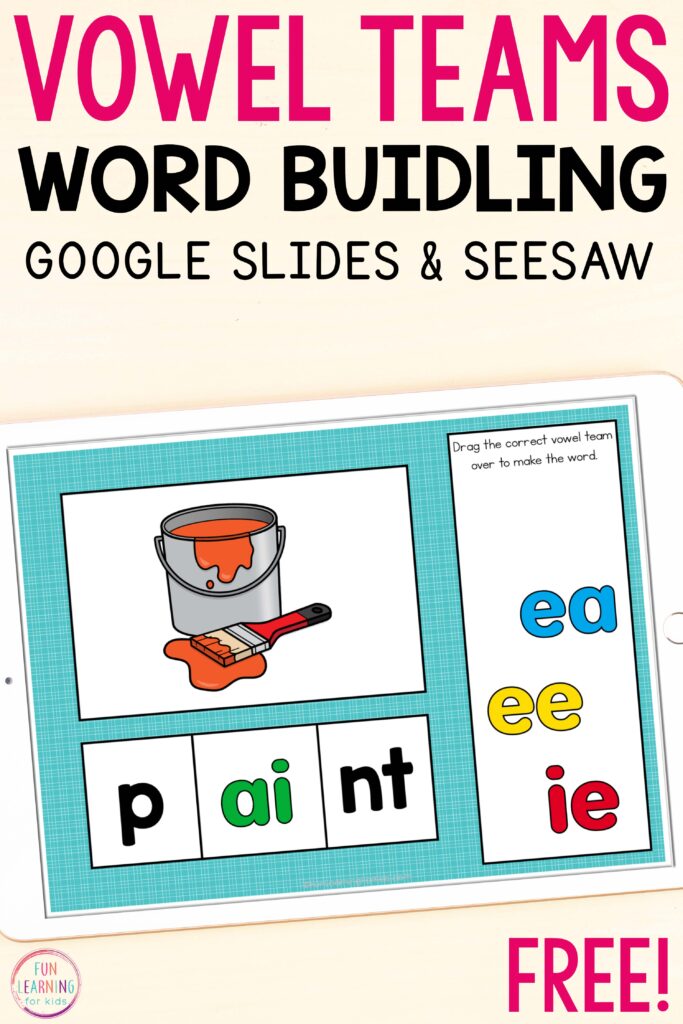
Google Slides or Seesaw can be used for this game. Kids have to fill in the missing vowel teams to finish the words. I love this game idea for young kids and it’s s a great curriculum-aligned activity.
Learn More: Fun Learning For Kids
9. Digital Phonics

Here’s a free bundle that includes CVC, long a, long e, long i, long o, long u, l-blends, r-blends, s-blends, digraphs, trigraphs, r-controlled, & diphthongs! Phonics are overlooked at times, so this game is the perfect way to get kids practicing.
Learn More: Simply Creative Teaching
10. Wordsmith

I love playing this type of game. Kids are given 3 letters to start and make as many words as they can. It only goes up to 5 letters and is presented in a kid-friendly format. It can be a challenging game for some, but tons of fun anyway.
Learn More: Poki
11. Word Ladder
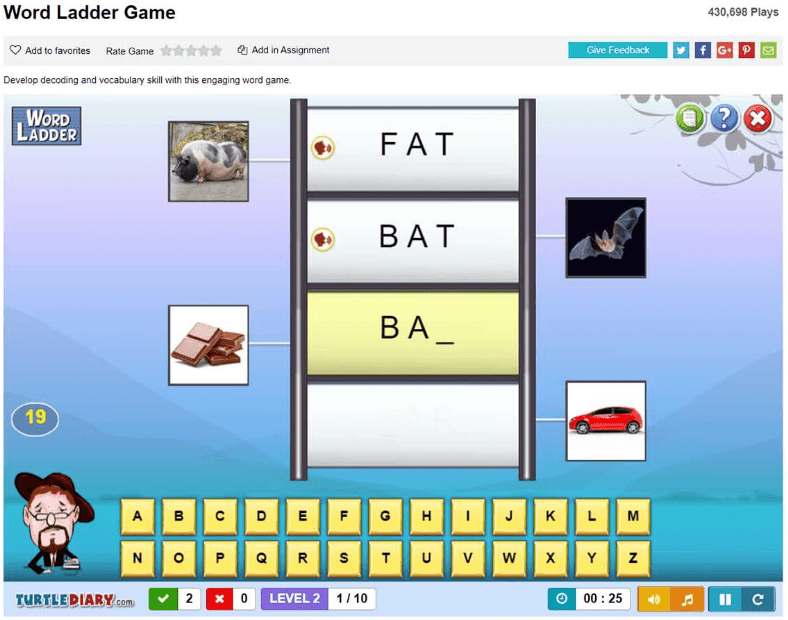
Honestly, I didn’t know what this game was, so I played it for a few minutes and it’s great. There are different levels based on grade, the words are missing 1 letter each, and have a picture clue next to them. When you get the correct word, it reads it aloud as well. It’s a great way to reinforce rhyming words and word families.
Learn More: Turtle Diary
12. Princess Pesto’s Spectacular Spelling Play

Kids who love Super Why will love this game. It builds phonemic awareness skills, using uppercase and lowercase letters. Princess Pesto tells them a letter sound to look for and they have to click on the correct sound. The graphics aren’t too flashy, but enough to grab the attention of little kids.
Learn More: PBS Kids
13. Reading Eggs

A free app that is a complete learn-to-read program. The lessons are based on the child’s ability level and grow with them, similar to ABC Mouse, but it’s made for ages 2-13. There are in-app purchases, so don’t forget those passwords for purchases.
Learn More: Educational App Store
14. Outspell

Online Scrabble game that has different levels of play. Place your word on the game board and see what your opponent adds. While this game isn’t providing specific instruction, it does help with spelling and problem-solving skills.
Learn More: Mind Games
15. Grammar Gladiator
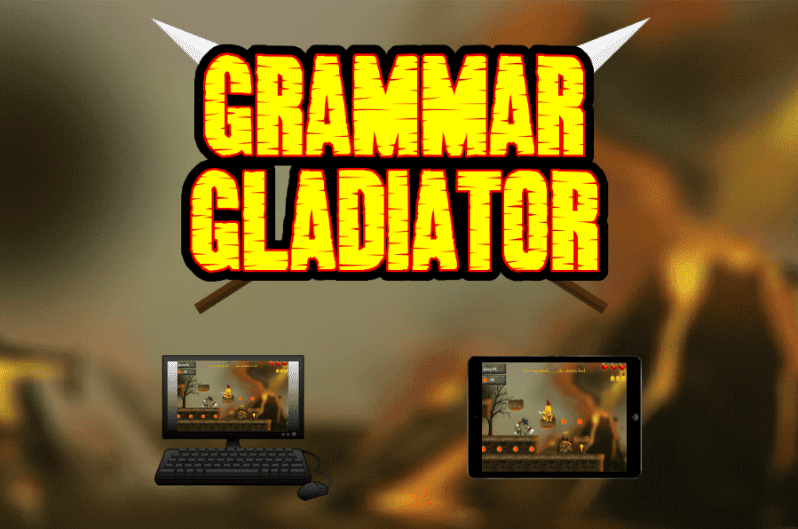
Battle your way through punctuation, conjunctions, homophones, articles, and verb tenses. It took me a minute to understand what to do in this game, but once I did, it was fun. It’s good for school-age children.
Learn More: Room Recess
16. Word Unscramble
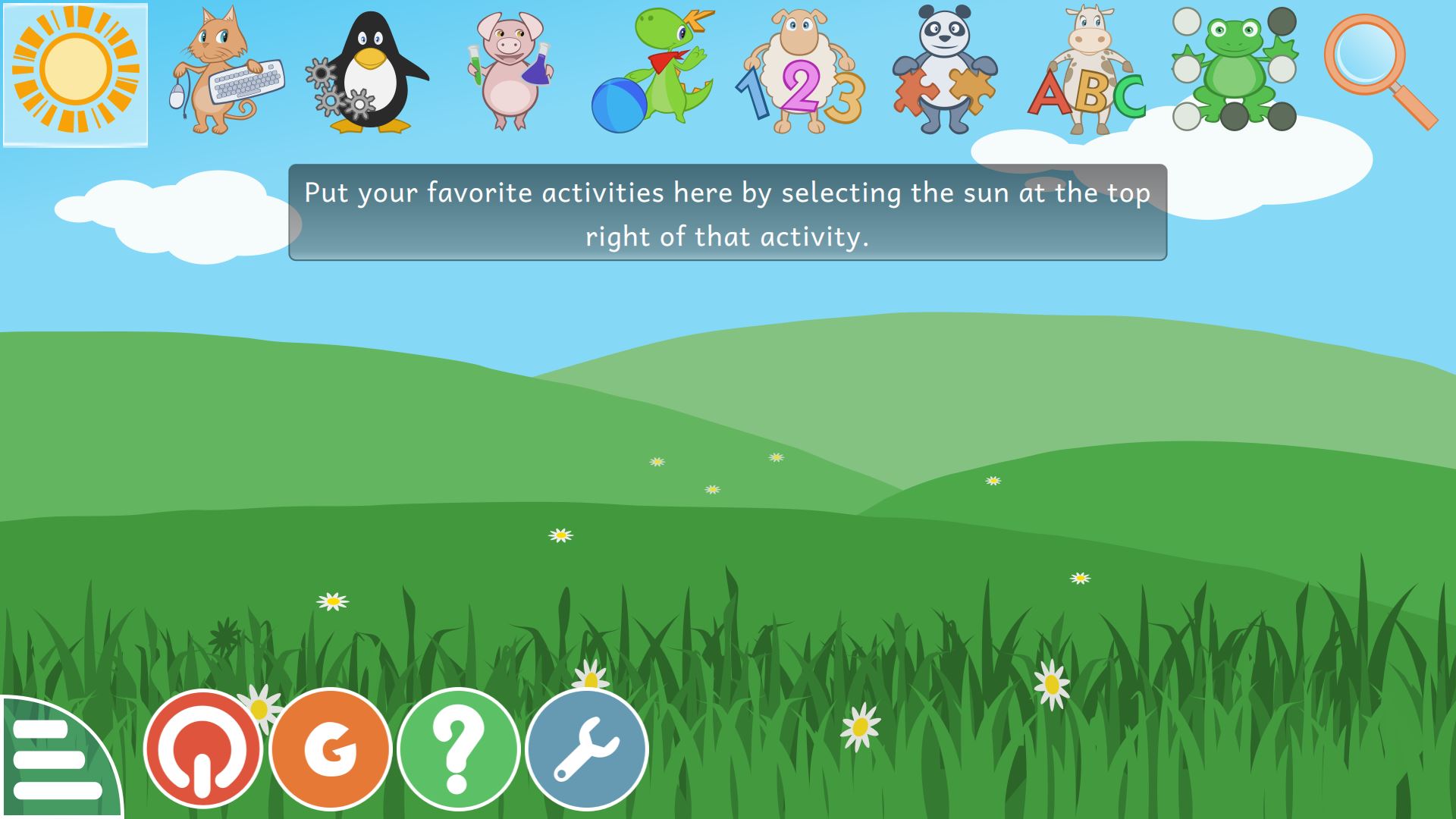
Made for grades 1-5, this online game is easy to play, but really can make kids think. All they have to do is unscramble the words, however, it gets harder as they go. The dancing penguin is cute too.
Learn More: Turtle Diary
17. Aim 2 Spell

Vocabulary City is one of my favorite educational game sites. In this game, kids will hear a word and see a sentence with it missing. Once they know what it is, they aim the cat at the mice and shoot the letters they need.
Learn More: Spelling City
18. Make Your Own Wordle
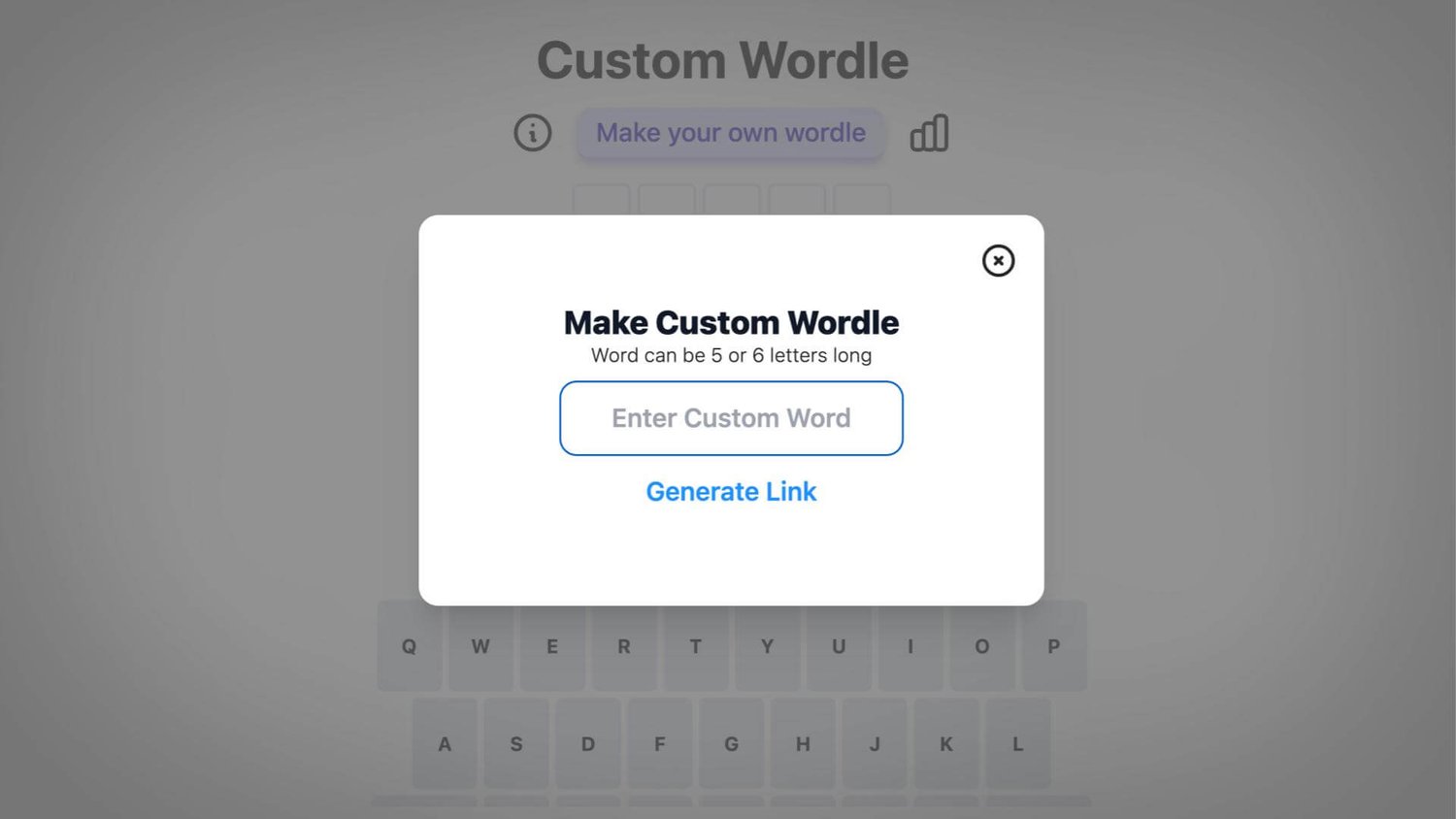
With Wordle being so popular, this is amazing. You can either put in your own word for kids or they can play with a random one. When they are answering, it works the same way as the classic game. I would use this as an everyday activity, maybe as a warm-up.
Learn More: My Wordle Strive Math
19. Knoword
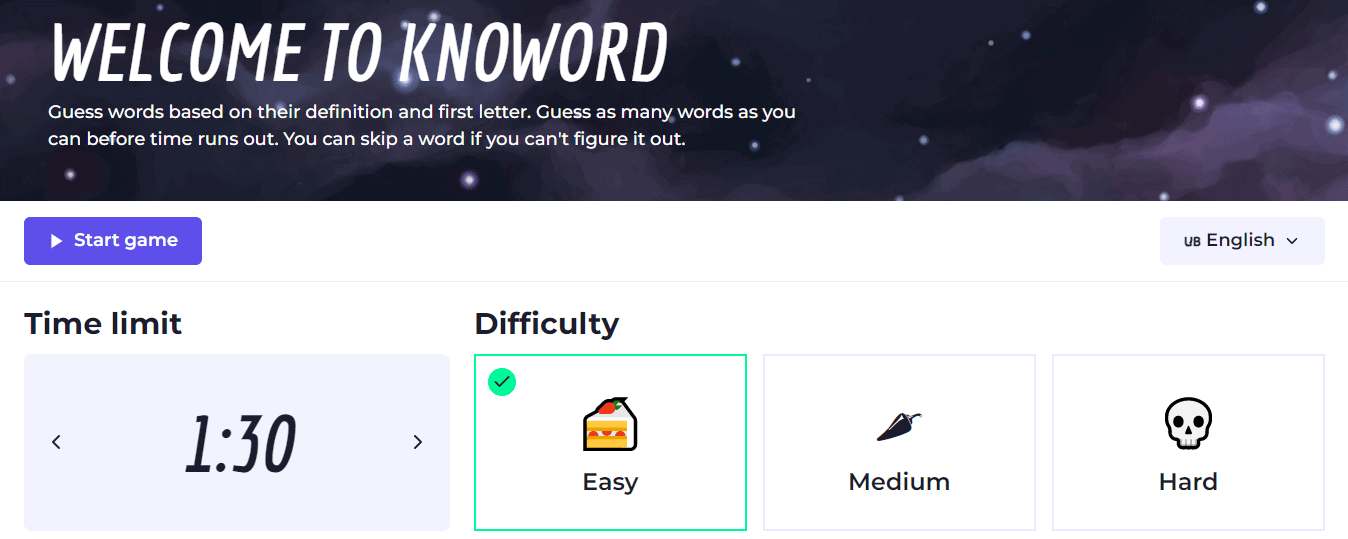
This online vocabulary game is tons of fun. You can play on your own or as a class to compete against one another, similar to Kahoot! This is a challenging game that can be used by middle or high school students. It can very easily be a standards-based game, as teachers can create their own set of questions as well.
Learn More: Play Knoword
20. Spelling Training

For this game, you can choose from a themed word list or enter your own. There’s a collection of games on the site that kids can play, all of which are going to reinforce the spelling of the assigned words. It even allows for you to import the words, making it simple to use and a spelling adventure for students.
Learn More: Spelling Training
21. Compound Word Game
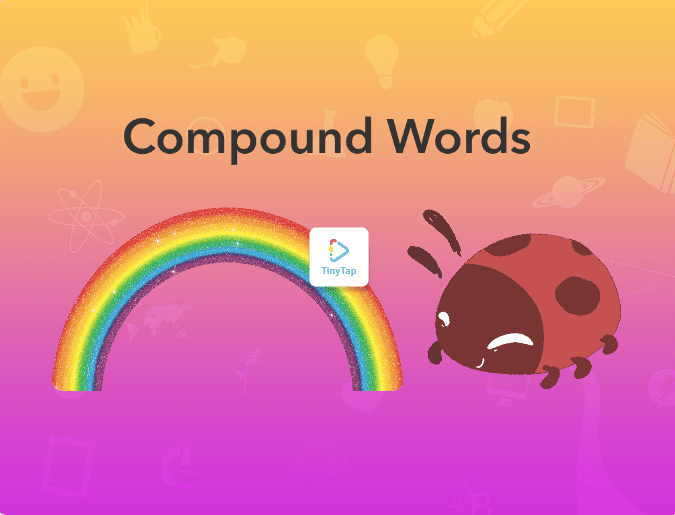
Children are asked to drag and drop the two words that make up a compound word. The voice used has a Southern accent, which may trip up some kids from time to time, but it’s good to hear a different type of voice represented. It’s not the most flashy game, but it does the trick.
Learn More: Tiny Tap
A Ship Comes Loaded
ESL Word Game — Vocabulary and Speaking: Memorisation, Forming Words from Prompts — Any Level — 15 minutes
In this ESL word game, students remember and say words beginning with a certain letter. Have the students sit in a circle. Ask the students to choose a letter of the alphabet, e.g. B. Explain that the aim of the game is to say a word beginning with the chosen letter and to remember what answers other students have given. Start the game by saying ‘A ship comes loaded…’ The first student replies ‘with what?’, and you say a word beginning with the chosen letter, e.g. ‘with bananas’. The first student then says ‘A ship comes loaded…’ to the second student. The second student replies ‘with what?’ The first student then repeats your word and gives their own answer, e.g. ‘with bananas and bears’. This continues around the circle. If a student fails to come up with a word, forgets what answers have been given or repeats a word, they are out of the game. The last student left standing wins the game.
Balderdash
ESL Defining Words Game — Vocabulary and Writing: Writing Definitions, True or False, Guessing — Group Work — Upper-intermediate (B2) — 25 minutes
This ESL word game is based on a popular board game of the same name. In the game, students invent false definitions for words and score points by correctly guessing true definitions. Give each group a set of balderdash word cards. The leader of the round chooses one of their word cards, reads the word aloud and spells it. The other students then each invent a short false definition for the word that could fool the other group members and write it on a slip of paper. The leader also copies the true definition onto a slip of paper. Each student then hands their definition to the leader who mixes them up and then reads each one aloud. The other students then vote on which definition they think is correct and the leader reveals the answer. Students score one point for each vote their false definition receives and two points for choosing the correct definition. The leader scores three points if nobody chooses the correct definition. The scores are added up and another student becomes the new leader and so on. The student with the most points at the end of the game wins.
Lewis Carroll’s Game
ESL Word Game — Vocabulary and Spelling: Forming Words from Prompts — Group Work — Pre-intermediate (A2-B1) — 20 minutes
This intriguing word game was invented by Lewis Carroll who wrote «Alice in Wonderland». Tell the students that they are going to play a game where they change one word into another by changing one letter at a time. Explain that letters cannot be moved, merely substituted. Every time a letter is changed, it must result in an English word. Give the following ‘wet to dry’ example to help the students understand: wet — met — mat — may — day — dry. Start the students off with one of the easier examples. Write the first and last word on the board. Working in teams, students try to change one word into the other. Allow the teams to use dictionaries to help them with possible words. When the teams have finished, ask them for their answers. Teams score points according to the number of steps taken to turn one word into the other, e.g. wet — met — mat — may — day — dry = six points. Play several rounds. The team with the ‘lowest’ score at the end of the game wins.
Match the Squares
ESL Word Game — Vocabulary: Memorisation, Matching — Group Work — Any Level — 20 minutes
This fun matching words game can be used when you want to review words that match in some way, e.g. adjective opposites, verb opposites, prepositions, past and present verbs, etc. Draw a six-by-four grid on the board and number the squares 1 to 24. Explain that behind each square is a word. The aim of the game is to match the squares by remembering where each word is. Tell the students that they cannot write anything down. The first team selects two squares, e.g. 2 and 16. You look at your word grid and write the two corresponding words in the selected squares. If the two words match, the team scores a point and has another turn. If the words don’t match, erase them. It’s then the other team’s turn to select two squares and so on. The game continues until all the word pairs have been matched correctly. The team with the most points at the end of the game is the winner.
Minimum
ESL Word Game — Vocabulary: Forming Words from Prompts — Group Work — Any Level — 20 minutes
In this challenging word game, students form words of a certain length that begin with specific letters. Write a five-letter word on the board, e.g. table. For young learners, start with a three-letter word. Teams then take it in turns to call out a word that begins with the last letter of your word, e.g. e. Each word called out must meet or exceed the minimum number of letters in your word. Teams are allowed to use plurals to meet the minimum, but they are not allowed to repeat words. As each word is called out, write it underneath the word in a line, e.g. elbow, editor, error, elbows, erase. When all the teams have called out a word, write a new word underneath and increase the minimum number of letters by one, e.g. scream. If a team can’t think of a word, start a countdown from ten. If the countdown goes to zero, that team is out of the game. The last team left standing wins the game. As a variation, for each line, teams call out a word that begins with the last letter of the word written on the board, e.g. elbow, water, report, teach, hello. You can also have the students spell words as well as call them out.
The Longest Word
ESL Word Game — Vocabulary and Spelling: Answering Questions, Guessing, Forming Words — Group Work — Any Level — 20 minutes
In this word game, students make the longest word they can from letters won by guessing the answers to clues. One team selects a letter of the alphabet, e.g. s. Choose a word beginning with that letter, e.g. silver. Then, give the teams a clue for the word, e.g. a metal commonly found in rings. The first student to correctly guess the word wins the letter for their team. The winning team then chooses another letter. The aim of the game is for teams to get enough letters to make a long word. At a suitable point, end the round and let the teams try to make the longest word possible from the letters they have won. The team with the longest word wins the round and is awarded the same amount of points as there are letters in their word. Play several rounds. The team with the most points at the end of the game wins.
Tic Tac Words
ESL Word Game — Vocabulary: Forming Words from Prompts — Group Work — Any Level — 15 minutes
Here is an engaging ESL word game based on Tic-Tac-Toe. Draw a three-by-three grid on the board. Write a random letter in each square. Under each letter, write a number between one and ten. Teams then take it in turns to choose a letter from the grid. The team then has ten seconds to say as many words beginning with the letter as the number under the letter indicates. If the team manages to say the required number of words, they win the square. If they fail to say the required number of words, play passes to the other team. When a team gets three squares in a row, either horizontally, vertically or diagonally, they win the game. If neither team gets three in a row, the team with the most squares wins. Play several rounds to find the ultimate winning team.
Two Words
ESL Word Game — Vocabulary and Speaking: Forming Sentences from Prompts — Group Work — Any Level — 20 minutes
This word game is ideal for reviewing vocabulary and sentence structure. Write two words on the board. The first student to put up their hand and create a suitable sentence that uses the two words wins the round for their team. The winning team then chooses one student from the other team to come and join them. If the students know each other well, they normally choose the students who are really good at English, making it easier to win the game. You then write two new words on the board and the game continues. The game ends when there is only one team left. So everybody wins! It’s best to start the game off with some easy words, e.g. pen and paper. Then, gradually make the words harder or crazier, e.g. tennis and buffalo.
Word Race
ESL Word Game — Vocabulary and Writing: Forming Words from Prompts — Group Work — Pre-intermediate (A2-B1) — 20 minutes
This ESL word game can be used to practice or review a variety of vocabulary. Tell the students that they have one minute to write down as many words as possible that match certain criteria, e.g. words beginning with certain prefixes, certain letters, words that rhyme, etc. Teams score one point for each word they write. Inflections are not allowed, i.e. changing a word to express different grammatical categories, e.g. hit, hits, hitting. Play several rounds using a different criterion each time. After each round, teams swap papers for marking. The team with the most points at the end of the game wins.
Word Square
ESL Word Game — Vocabulary and Spelling: Forming Words from Prompts — Group Work — Any Level — 20 minutes
Here is a fun ESL word game to play with your students. Draw a three-by-three grid on the board. In the squares, write a nine-letter word in a random order. The centre square must contain a vowel. The aim of the game is for the teams to make as many words as they can with the letters in the square. Every word the teams write must contain the centre letter. Students cannot use any letters twice unless they are in the nine-letter word. Teams also get a bonus score if they make a word using all nine letters. Set a time limit of two minutes. The teams write as many words as they can from the square. When the time is up, teams swap papers for marking. Teams score one point for each letter in a correctly spelt word. For example, a three-letter word is worth three points, a four-letter word is worth four points and so on. If a team gets the nine-letter word, they score 18 points. Play several rounds using a different nine-letter word each time. The team with the most points at the end of the game wins.
10000+ результатов для ‘english language games’
Irregular verbs Superheroes Trendy English
Совпадающие пары
5-й класс
6 класс
7-й класс
8 класс
9-й класс
10-й класс
11 класс
Средняя школа
Техническое / профессиональное образование
Высшее образование
English
Trendy English Games
numbers 0-10
Упорядочивание
Дошкольник
1-й класс
2-й класс
3 класс
Начальная школа / начальная
English
English language
Article a/an
Случайное колесо
English language
article a/an
Spotlight 2
GG1 Unit 0.3 Anagram
Анаграмма
English
English
Go Getter 1
Unit 0
classroom language
Classroom obejcts
Pillow sleeping
Сопоставить
5-й класс
Начальная школа / начальная
Средняя школа
English
Games
3F Questions about games Solutions Pre-Intermediate
Откройте поле
adults
kids
teenagers
teens
determiners
english
grammar
quantifiers
solutions
Speaking
unit 3
vocabulary
3F
English
many much
pre-intermediate
Questions
solutions
solutions pre-intermediate
speaking activity
unit 3
Video games
Adjectives order
Упорядочивание
5-й класс
6 класс
7-й класс
8 класс
9-й класс
10-й класс
11 класс
12-й класс
Начальная школа / начальная
Средняя школа
Среднее образование
Высшее образование
Adults
English
English language
PET
Have/Has got (?)
Привести в порядок
English language
Have/has got
Primary Grammar
Spotlight 2
Emotions (1)
Откройте поле
English language
emotions
vocabulary
House objects
Случайные карты
English language
Spotlight 2
Spotlight 3
vocabulary
Vocabulary is an important part of every subject; there are always words that students need to learn in order to better understand the concepts being taught. Unfortunately, many students struggle to remember what unfamiliar vocabulary words mean, or feel intimidated by the idea of simply memorizing definitions. No matter your subject material, you can help students learn difficult vocabulary using these 9 classroom vocabulary games!
1. Synonyms
Associating a vocabulary word with its synonyms is a great way to form lasting connections between the word and its definition. Here’s an exercise you can try with your students:
- Break the class into 2 groups.
- Assign each group half of the vocabulary words.
- Have students use a dictionary, thesaurus, or the Internet to discover synonyms for each vocabulary word.
- Then, have the groups take turns reading the list of synonyms to the other group.
- See if the groups can figure out what the word is based on its synonyms.
2. Checkers
Recycle this familiar board game into a memorization exercise:
- Group students into pairs.
- Give each set of students a copy of this printable checkerboard:
- Students should write a vocabulary word in white space available in each square.
- As students play through a game of checkers, ask them to provide the correct definition of the word in the square they want to move their piece to.
- Another option could also be having the student use the vocabulary word in a sentence.
- If the student correctly defines the word or uses is in context, they get to claim that square.
3. Vocabulary Bingo
A similar idea to the checkers game, you can have students create their own Bingo card, with a vocabulary word in each space:
- Once the cards are assembled, read the definition of each word.
- Students should be able to determine what word you defined and put a counter on that square.
- Have students say “Bingo” when they get 5 words in a row.
- As an extra incentive, provide a prize for winners. It could be a free homework pass, candy, or small toy!
4. Pictionary
A great way to get the whole class involved is by playing Pictionary:
- Split the class into 2 teams.
- Have one student from each team come to the board.
- Assign them one vocabulary word to draw.
- The students’ teams should try to guess what vocabulary word is being drawn, within a certain time limit—whichever team guesses correctly first gets a point.
- Repeat with different members of each team coming to board until all the vocabulary words have been drawn, then tally the points, and declare a winning team!
5. Charades
Charades is set up similarly to Pictionary. However, instead of drawing, students act out the vocabulary word. If you have timid students, consider assigning 2 people to act out the words at a time, or breaking the class into smaller groups.
6. Circle Rotations
To get everyone up and moving, try a circle rotation exercise:
- Split the class in half, and have them form two concentric circles in the room, facing each other.
- Hand out flashcards to each student with a vocabulary word on one side and its definition on the other.
- Students in the inner circle can test the students in the outside circle and vice versa.
- Have the students in the outside circle rotate one person to their left each time until everyone has seen each word.
7. Trashcan Basketball
Another physically engaging group activity is trashcan basketball:
- Divide the class into 2 or 4 teams.
- Have each team take turns answering a vocabulary question.
- If they can answer correctly, the team gets 1 point.
- Then, give that team a ball (a crumpled up piece of paper will do).
- If the team can make a basket into the trashcan, reward the team an extra point.
- Repeat until all vocabulary words have been tested!
8. Newspaper Search
For a quieter activity for individuals or smaller groups, try having students look for pictures or articles in newspapers or magazines that relate to each vocabulary word. Give your students a set amount of time to complete the assignment then have them present their findings in groups or to the class.
9. Flyswatter Game
- Write each vocabulary word on the board.
- Divide the class into 2 teams.
- Have one student from each team come to the board holding a flyswatter.
- Read the definition of a vocabulary word.
- Students should race to see who can locate the correct word on the board the fastest.
- When they find it, they should hit the word on the board with the flyswatter.
- Play until everyone in the class has had at least one turn!
Classroom vocabulary games are some of the many fun teaching games out there and a great way to motivate students to study the words. It also helps them review the definitions. Most of these games don’t require a lot of preparation to play, so you can play them whenever you have extra time that you need to fill or just need a fun activity!
Vocabulary word games to play with middle schoolers- Word Work, Vocabulary Diction. All of these terms make learning new words so borrring! That’s why these 5 word games to play with middle schoolers will make your ELA class a lot more engaging.
The Power of Words and Games
When I think about words, I think about their power. I think about how words help us to express ourselves. I think about the types of stories and poetry I can create using these words.
As a writer, I think about how I like to play with words. I think about how I like to put together words into different combinations like alliterations or metaphors or even oxymorons. So when, I think about teaching kids vocabulary, I really think about teaching them how to play with words. As a teacher, I feel that when we teach our kids the magic of word choice, students learn the power of clarity.
Kids love to play games. So when I teach vocabulary, I try to think of as many word games to play with middle schoolers as I can. Word study takes a lot of repetition just like any other type of learning. So, if we can make learning new words fun for our kids, they learn to love words as much as we do.
Word Game 1: Act out the words
One word game to play is to get students to pair up and act out the words. One partner acts out the word, and the other partner tries to guess what the word is. They record each word they guess correctly on a worksheet or in a form on Google drive. This makes students accountable while they play with words.
Once they have practiced with one partner, they can switch to a different partner, and do all the words again. (Usually, I have students work on 5-10 new words per week.)
By using more than one sense of seeing and saying the word or just reading the word, the students are activating their amygdala, which controls part of the pleasure center of the brain. Coming up with hand motions or actions is fun, awkward and will lead to a lot of noise, but students will be learning words faster and easier. Make sure students know what you want them to do, and you set a time limit. This will be a productive lesson, and it can also build a positive classroom community.
Word Game 2: Describe the word using the 5 senses
Another word game to play with middle schoolers is through description. Have students write their word, and try to describe it using the five senses. For example, for the word “occurrence,” the student would think about an event that happened to them and use the five senses to describe this occurrence. They should use the word about three times at least in their description. This may be repetitious, but it helps them to think about ways to use the word “occurrence” in sentences.
A variation of this word game might be to have the students describe the word using the five senses without using the word in the paragraph. Then, a partner has to guess what the word is. Do a couple of words a day with this, not all of them.
Word Game 3: The Mirror Game
In this word game, you facilitate the learning of the new words. Introduce a new word and give it a hand signal or action. Then, have students mirror what you say and do. Get them to practice this word, its signal and definition over and over again for 30 seconds as they mirror you. Then, have them practice the same word with a partner, mirroring each other.
Once students have practiced this for 30 seconds, go onto a new word. I learned this technique from Chris Biffle and Whole Brain Teaching. Middle schoolers often feel silly doing this, so it’s important that everyone is doing it and that you laugh along with them. Tell them that it is okay to laugh and that by participating they will all get 100s on their next vocabulary test. You could even give them a pretest first, so they can see the improvements they make after playing this game. I use this often, click on this blog post to see how I used it with Black Ships Before Troy.
Word Game 4: Quizzers and Quizzees
This word game for middle schoolers will have them lining up. I use either a double line up or inside-outside circle. One line of students (or the outer circle) will be what I call the “Quizzees.” The other line of students or the inner circle will be the “Quizzers”.” move when you yell, “Switch,” which signals them to switch partners. The other line stays put. The line that does not move are called the “Quizzers.” They give the word to the moving line, whom I call the “Quizzees.” Quizzees tell what the word means and uses it in a sentence. Let students do this for four or five words before you yell “switch” and the moving line moves down one person. The Quizzers keep giving the words on the list. After the line of students has gotten back to their original partners, have the “Quizzees” become the “Quizzers.”
Word Game 5: Alliteration Agility
Yes, I just made that Vocabulary word game to play with students – Word Work, Vocabulary Diction. All of these terms make learning new words so borrring! That’s why these 5 word games to play with middle schoolers will make your ELA class a lot more engaging. up for this game, right now, as I am writing this. I used a word list of nouns that start with “a” to help me out. However, we can have students do the same thing with new words. What two words could be paired together with alliteration and still make sense? You have to be pretty agile to do that!
Put students in two teams, have them write as many alliterative pairs that make sense as they can on the board. You could even have them do a relay race, where students of each team have to pass on the marker to someone else on their team who is waiting in line. The other team mates could be looking up alliterative pairings. You could also do this same activity with rhyming words.
For more word games to play with middle schoolers and EDITABLE vocabulary activities for interactive notebooks or learning centers, click here in my TPT store.
This post contains affiliate links.
I found 12 board games to strengthen vocabulary, that can be played at:
- School, like Go for the Dough
- Home, for example Blurt!
- Home and School, where Volangulary is my preferred one
Vocabulary Board Games Comparison Table
I prepared this table to give you a quick comparison on common features of the vocabulary board games.
| Game | Age | Notions | Players | For | Price | Rating |
|---|---|---|---|---|---|---|
| Multiple Meanings Around the World | 9-10 | Multiple meaning words | 2-4 | Home, School | $$ | ★★★☆☆ |
| Synonym & Antonym Gold Rush | 9-10 | Synonyms and antonyms | 2-4 | Home, School | $$ | ★★★☆☆ |
| Blurt! | 7+ | Definitions, clues | 3-12 | Home | $$ | ★★★★☆ |
| Go for the Dough | 5-8 | Opposites, synonyms, multiple meanings, definitions, rhyming, categories | 2-6 | School | $$$$ | ★★★★☆ |
| Volangulary | 6-10 | Definitions, reading, making sentences | 2-6 | Home, School | $$$ | ★★★★★ |
| Quizmo Vocabulary | 10-13 | Synonyms and antonyms | 2-4 | School | $$ | ★★★☆☆ |
| Vocabulary Chipper Chat | 6-10 | Analogies, associations, attributes, categories, comparisons, context, figurative language, functions, homonyms, homophones, synonyms, antonyms, verbs | 2-5 | School | $$$$$ | ★★★☆☆ |
| Vocabulary Family Engagement Pack | 3-5 | Opposites | 1-2 | Teachers to engage families | $$$ | ★★★☆☆ |
| Hot Words | 12+ | Definitions | 4-20 | Home | $$ | ★★★☆☆ |
| Words on the Street | 12+ | Categories | 2-8 | Home | $$$$ | ★★★☆☆ |
| Words on the Street Junior | 8+ | Categories | 2-4 | Home | $$$ | ★★★☆☆ |
| Lexogon | 8+ | Finding words with specific letters | 2-6 | Home | $$$ | ★★★☆☆ |
Vocabulary Board Games for Home and School
Volangulary (Nasco Education)
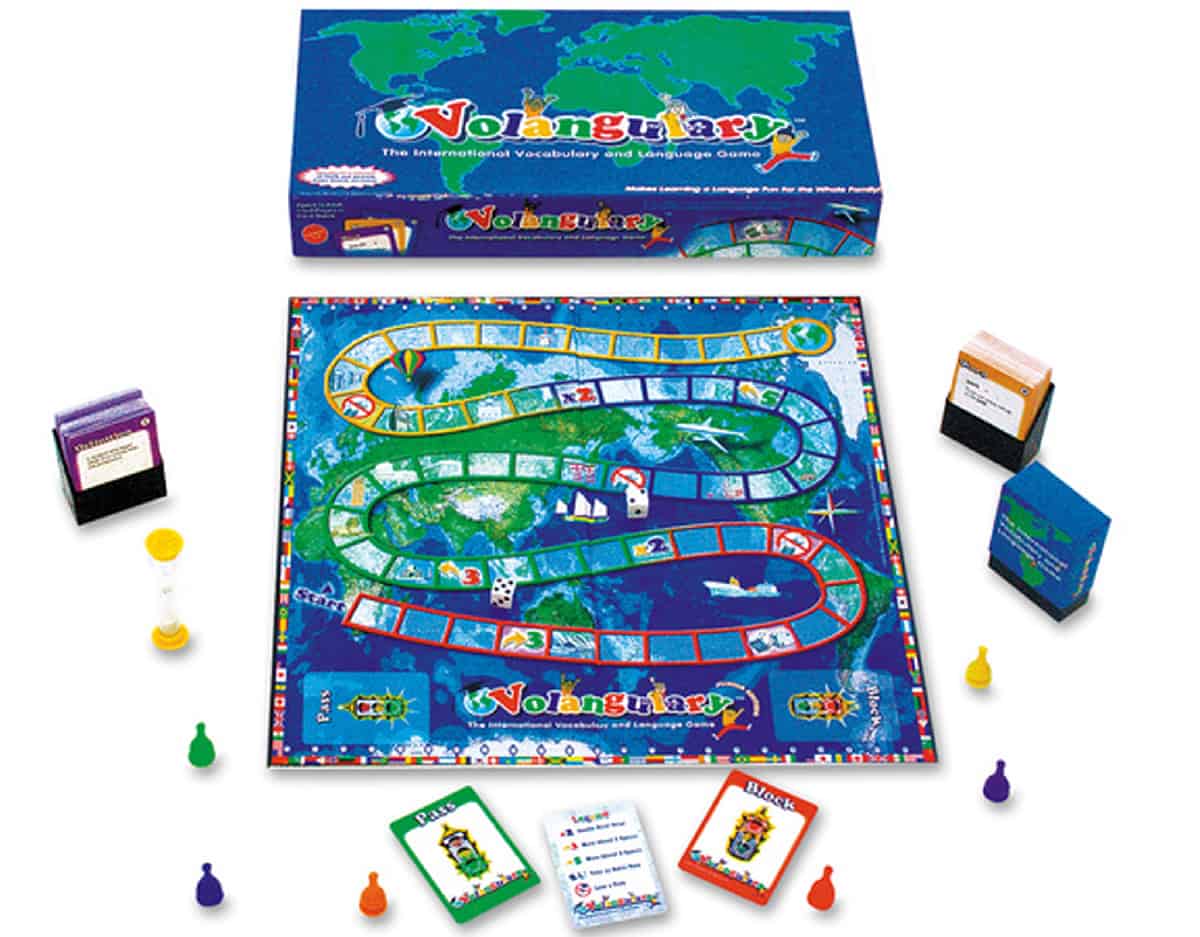
★★★★★
For Families and Teachers | Age 6-10 | 2-6 Players | 30 minutes
In Volangulary
Volangulary presents two levels of play: Junior and Advanced, each using a different side of the board:
- Junior: players use the side of the card with a sentence that uses the word. You can ask them to just read the sentence properly (used for reading practice), or to create a correct sentence using the word by themselves.
- Advanced: players use the side with the definition of the word. They read the definition and must guess the word.
What is great about Volangulary is that:
- It includes 570 cards (so it is truly replayable, and has a lot to offer as a learning material)
- You can really manage a progression
- The three card colors (purple, blue and yellow) correspond to levels of difficulty.
- The actual difficulty is given on the upper right-hand corner of the card as K, 1, 2 and 3
- You can have children of different ages play together while maintaining the interest of the game for all (just select the cards that are relevant for each age). This is a really rare feature that is very valuable at home.
- Enables to work reading words, definitions and building sentences
You can avoid using using pass/block cards, and giving penalties for incorrect answers, as these are more a nuisance than a feature in my opinion.
Multiple Meanings Around the World (Lakeshore Learning)
★★★☆☆
For Families and Teachers | Age 9-10 | 2-4 Players | 30 minutes
In Multiple Meanings Around the World
It includes a decoder (provides an answer key through a red filter), 45 question cards, and 20 challenge cards.
The main objective is to reach Australia and answer the question cards correctly.
A player who lands on a standard space has to answer a “question card”.
A player who lands on a country space can choose a “question card” or a “challenge card”:
- Question card– the game proceeds as normal
- Challenge card– if the answer is correct, the number obtained from rolling the dice becomes double which lets the player advance faster in the game. These questions are tough though, so children may either find this exciting or frustrating
Other special spaces are:
- “Jump to” – the player moves to the country that was named on the space.
- “Shortcut”/”Backtrack” – the player moves towards the end of the highlighted path (or the other way)
- “Move up or back X spaces” – the player moves the number of spaces indicated on the board
- “Lost Passport”- the player is stuck until he rolls a 2, 4 or 6.
- “Lost your Way”- the player loses a turn.
The strong points:
- Answers to MCQs can be checked through the decoder.
- The game board has colorful illustrations and easy to follow instructions.
- It can be played cooperatively.
I cannot give more than three stars though, because:
- There are not enough cards, making replayability a real concern
- There is no real progression in difficulty, only the “question cards” and “challenge cards” introduce a level of difficulty
Synonym & Antonym Gold Rush Vocabulary Game (Lakeshore Learning)
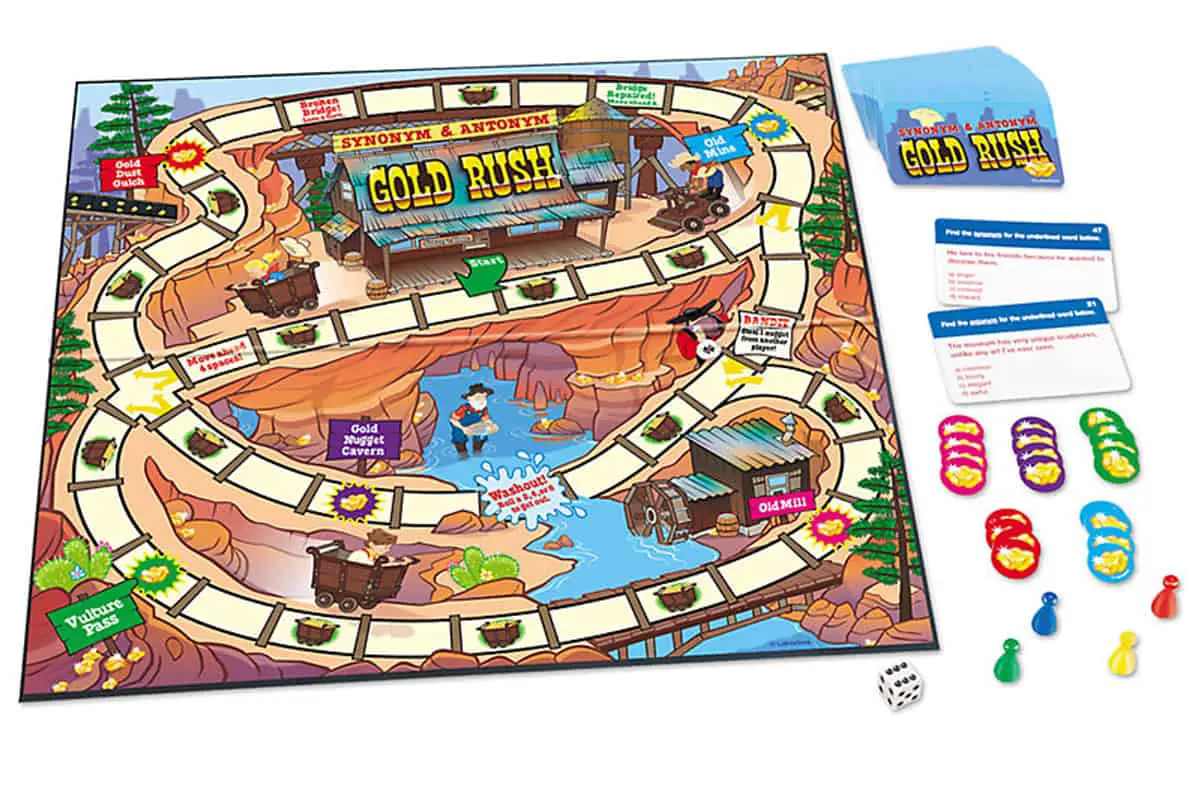
★★★☆☆
For Families and Teachers | Age 9-10 | 2-4 Players
In Synonym & Antonym Gold Rush
This game includes 50 question cards, 20 chips, and an answer card.
Each question card contains a sentence with an underlined word. Players must give the synonym or antonym of the given word.
Just like other race board games, there are special spaces with obstacles: Losing a turn, Getting stuck on the mine railway unless they roll a 2, 4, or 6, Having their golden nugget stolen by other players.
Some pros:
- There are no penalties for incorrect answers
- The answers are provided for immediate correction
But the problem is that there are only 50 question cards, which makes the replayability of the game low, and there is no progression (levels of difficulty of question cards are not included). This is why I only give 3 stars.
Vocabulary Family Engagement Pack (Lakeshore Learning)
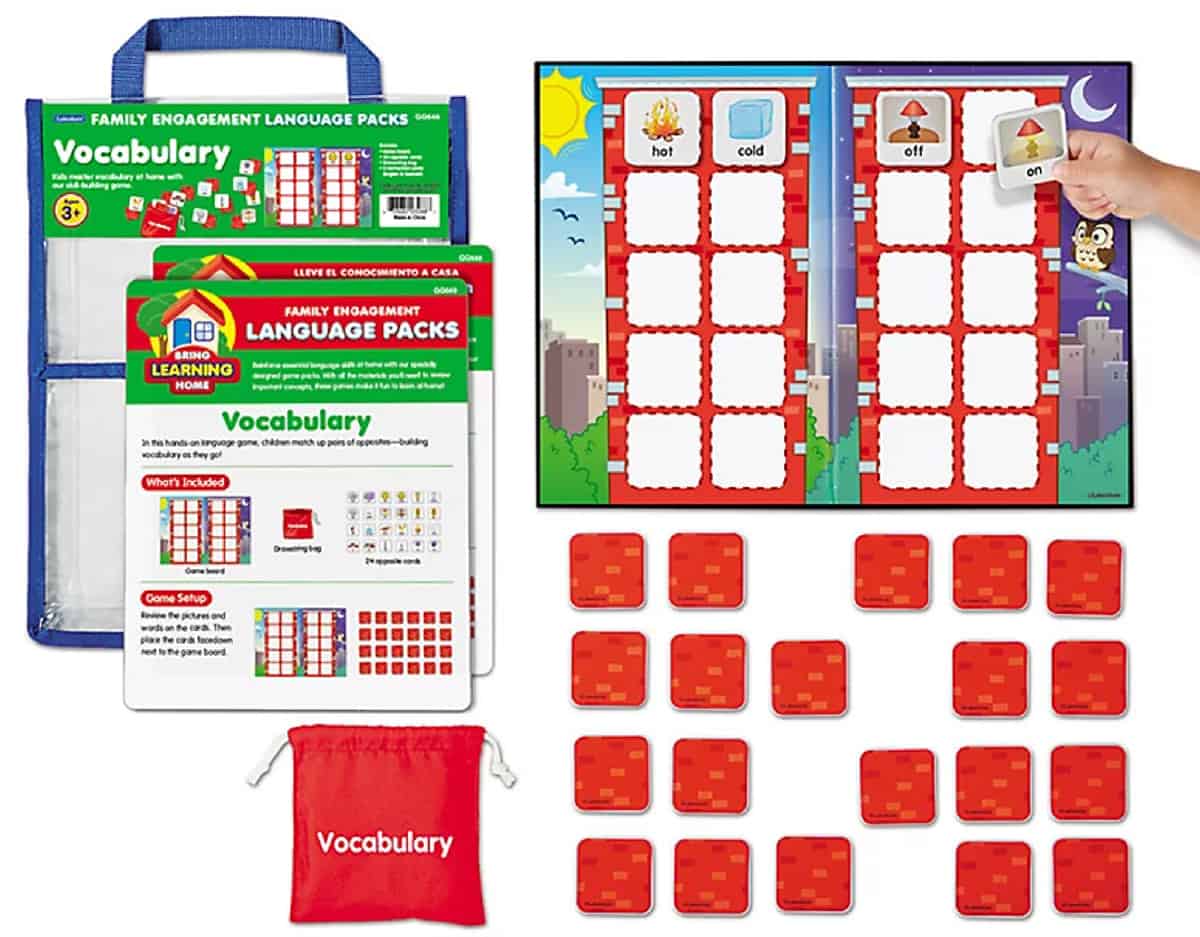
★★★☆☆
For Teachers to engage Families | Age: 3-5 | 1-2 Players | 30 minutes
Vocabulary Family Engagement Pack
Children should review the cards first before placing them face down on the gameboard. Players must get a pair of cards that have opposite meanings.
Card illustrations serve as clues for 3-5 year-olds.
The principle is good and simple, but there are really too few cards included there should be at least twice as many.
Go for the Dough (Super Duper Publications)
★★★★☆
For Teachers | Age 5-8 | 2-6 Players
In Go for the Dough
This game contains 480 “fake dollar” cards with one word on each, the question belonging to six different types (80 cards per type):
- Opposites: propose an opposite for the word
- Synonyms: propose a synonym for the word
- Multiple Meanings: explain two meanings of the word
- Definitions: give a definition to the word
- Rhyming words: find a word that rhymes
- Categories: propose a category the word belongs to
Players pick a card and answer the question. If they answer correctly, they can move their pawn on the gameboard, according to the number on their die.
Whether the player’s answer is correct or not, the fake dollar card goes to the center of the gameboard (where it will serve as the bank). A player who lands at grandma’s house collects all the cards in the bank.
The player with the highest number of fake dollars, in the end, wins the game.
The good points of this game are:
- 480 questions means the game is replayable
- 6 different notions (which you can filter according to your aim)
- Attractive theme
You can foster collaboration by encouraging students to help others when they have a difficulty in proposing an answer – but after giving enough time to the player at their turn of course.
I regret that there is no notion of progression though.
As there are no answers provided, I do not recommend it to parents, although the game can be played at home of course.
In this section, I included 4 vocabulary board games that are suited for classroom play due to elaborate categories and mechanics.
Quizmo Vocabulary (Learning Advantage)
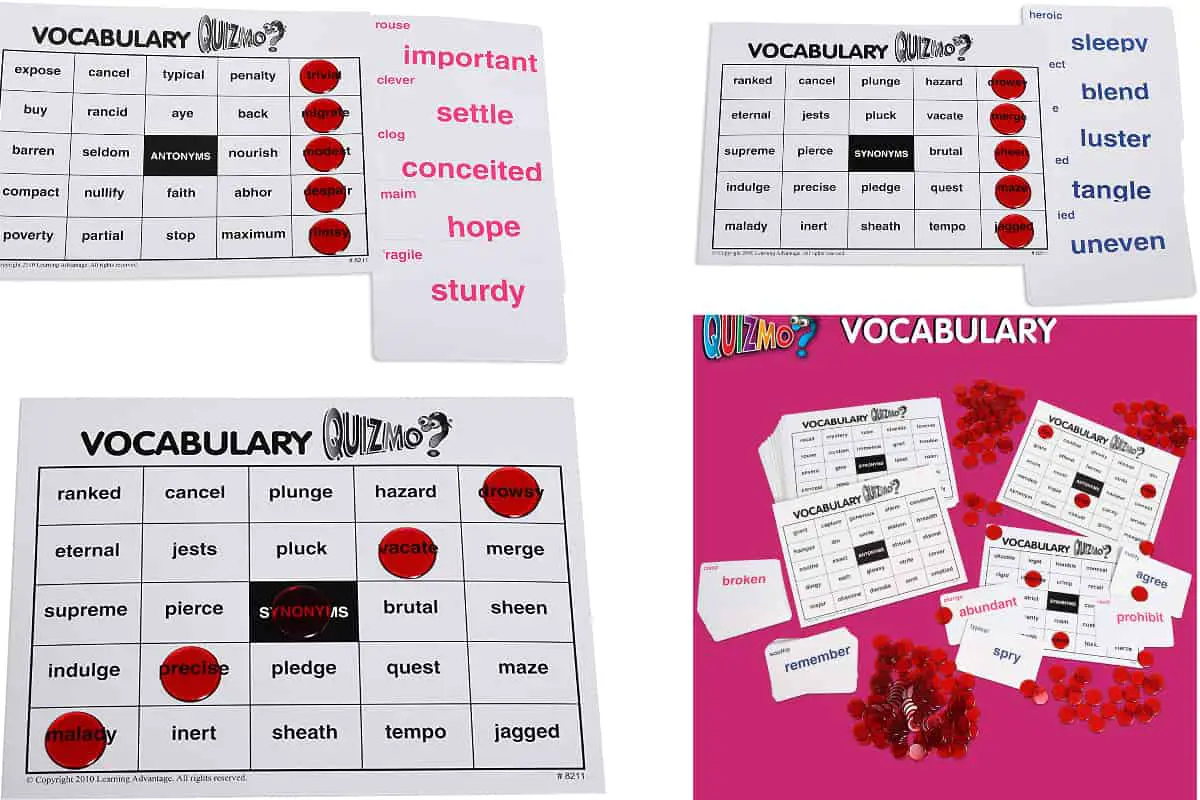
★★★☆☆
For Teachers | Age: 10-13 | 2-36 Players
Quizmo Vocabulary
It consists of
- 36 double-sided grid card
- 240 calling cards featuring 480 questions
- Plastic markers
There are two ways to use it:
- The calling cards can be used as flashcards. Each card is color-coded (synonyms in pink, antonyms in blue) and has the answer on its back
- The grid cards are played like Bingo. Each card has 24 words while the box in the middle indicates the category (synonyms or antonyms). Therefore you can play with a few players, but also with your entire classroom.
Although Quizmo encourages children to learn more words:
- Players may need to consult the dictionary to check the meaning of unfamiliar words (or get help from an adult) which will affect the speed of the game. Including word definitions on the cards would have really helped.
- The design of the calling cards is dull.
- There is no way to manage progression
Vocabulary Chipper Chat (Super Duper Publications)
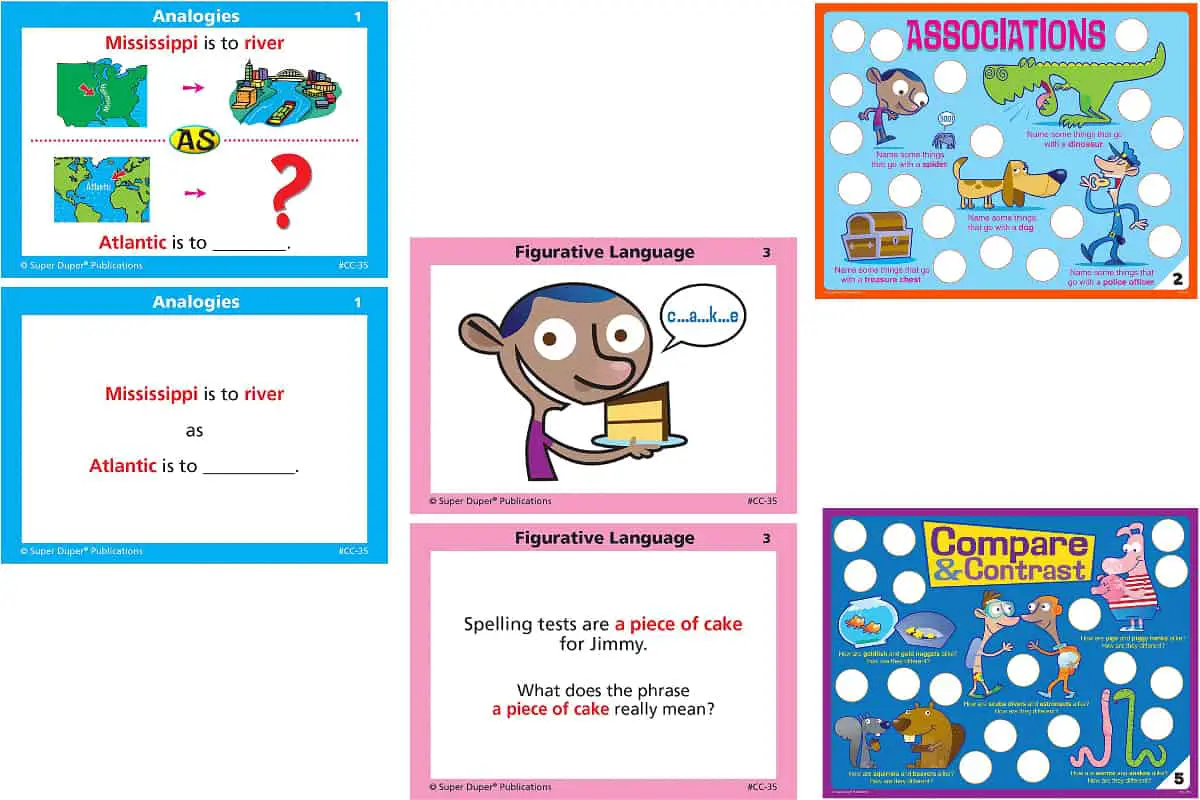
★★★☆☆
For Teachers | Age 6-10 | 2-5 Players | Grade 1-5
In Vocabulary Chipper Chat
- Analogies
- Associations
- Attributes
- Categories
- Compare and contrast
- Context clues
- Figurative language
- Functions
- Homonyms
- Homophones
- Synonyms & Antonyms
- Verbs
This game consists of:
- 60 grid gameboards (5 gameboards per theme)
- 360 vocabulary cards (30 color-coded prompt cards per theme), each with an illustration in front and an instruction at the back.
- Magnetic wand, 100 magnetic chips, a pair of dice
To play, draw a prompt card. Follow the instruction. If the answer is correct, roll the die to determine the number of magnetic chips the player should place on the circles of their gameboard.
Players continue until all the circles on their gameboard are filled with magnetic chips. Players use the magnetic wand to collect the chips at the end of each round.
The pros:
- suited for one-on-one session or small group activity
- teachers can assign appropriate categories according to their goal for the session
The cons:
- An adult must be there to correct the answers
- There is no progression within each theme
Vocabulary Board Games for Families
Blurt! (Educational Insights)
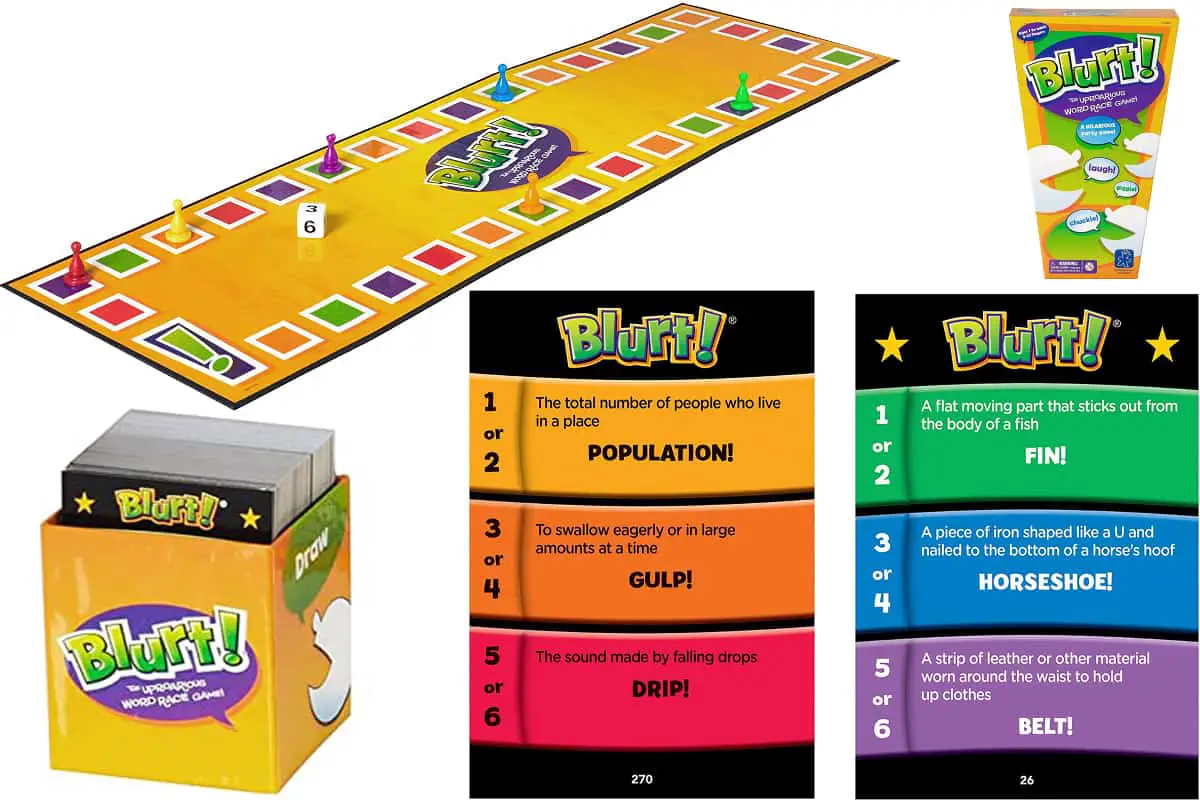
★★★★☆
For Families | Age 7+ with my proposed rule mods, 10+ else | 3-12 Players
Blurt!
The mechanics include rolling the die to determine the number of spaces the player will move on the board and the definition that will be read. The first player to circle around the game board wins the game.
Here are the pros and cons:
- There is no penalty for wrong answers, which is great. Children can try many times as they can until someone blurts the correct answer.
- The game is really replayable with its 1200 words
- But “Blurt!” is really competitive which will discourage slower players or younger players with less vocabulary (unfortunately it is the ones who need to progress the most).
- And there is no notion of progression (the words are not organized by levels of difficulty, which is a pity)
Because of this Blurt! cannot be recommended for use in the classroom.
You can of course change the rule to allow younger players or slower players to participate:
– Make the game cooperative: The aim of the game is for everybody to close the full circle. Players are allowed to give other players clues when they do not find the word, such as the first letter of the word, or the first syllable or the word
– Let younger players time to search before older or more advanced players are allowed to give answers (just use a timer for example)
Blurt! helps:
- Practice word rapid recall
- Learn new words or better understand the meaning of words they already know
Hot Words (Spin Master)
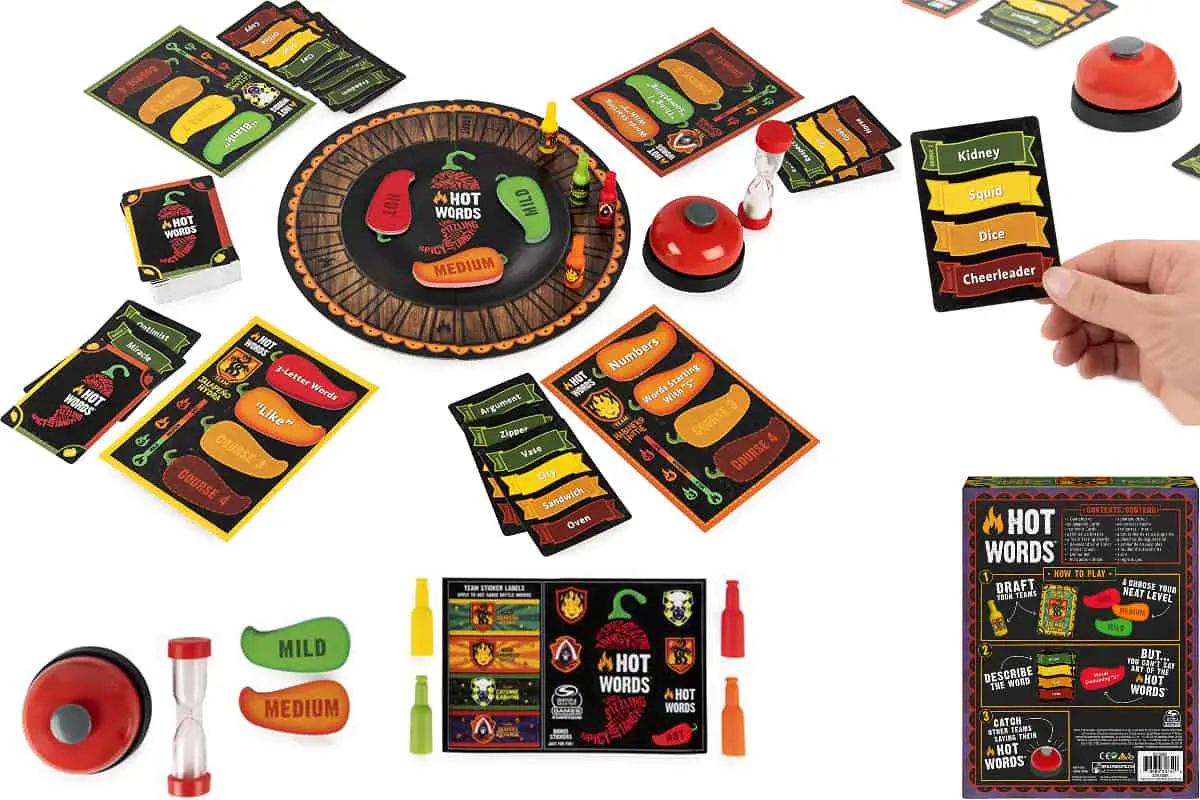
★★★☆☆
For Families | Age 12+ | 4-20 Players
Hot Words
Players on the same team help each other guess the word they draw by describing it. But they cannot use the “hot words types” described on the “Jalapeno cards” that they have drawn since the beginning of the game (for example a spicy red card is “three-letter words” meaning that you can no longer use three-letter words to describe the word you want the others to guess.
It is restaurant-themed, with several “restaurant artifacts”:
- 4 “team tasting” boards
- 50 “Jalapeno cards”
- 150 word cards
- 4 hot sauce bottles (Playing tokens)
- A dinner bell & a sand timer
This game is great because of its well-designed theme, and its increasing difficulty during the game. Players have to be creative and find alternative ways to describe words (without miming for example).
The players (12+) will not learn new words of course, but they will try to describe and define them under constraints, which is a great exercise.
Word on the Street (Out of the Box)
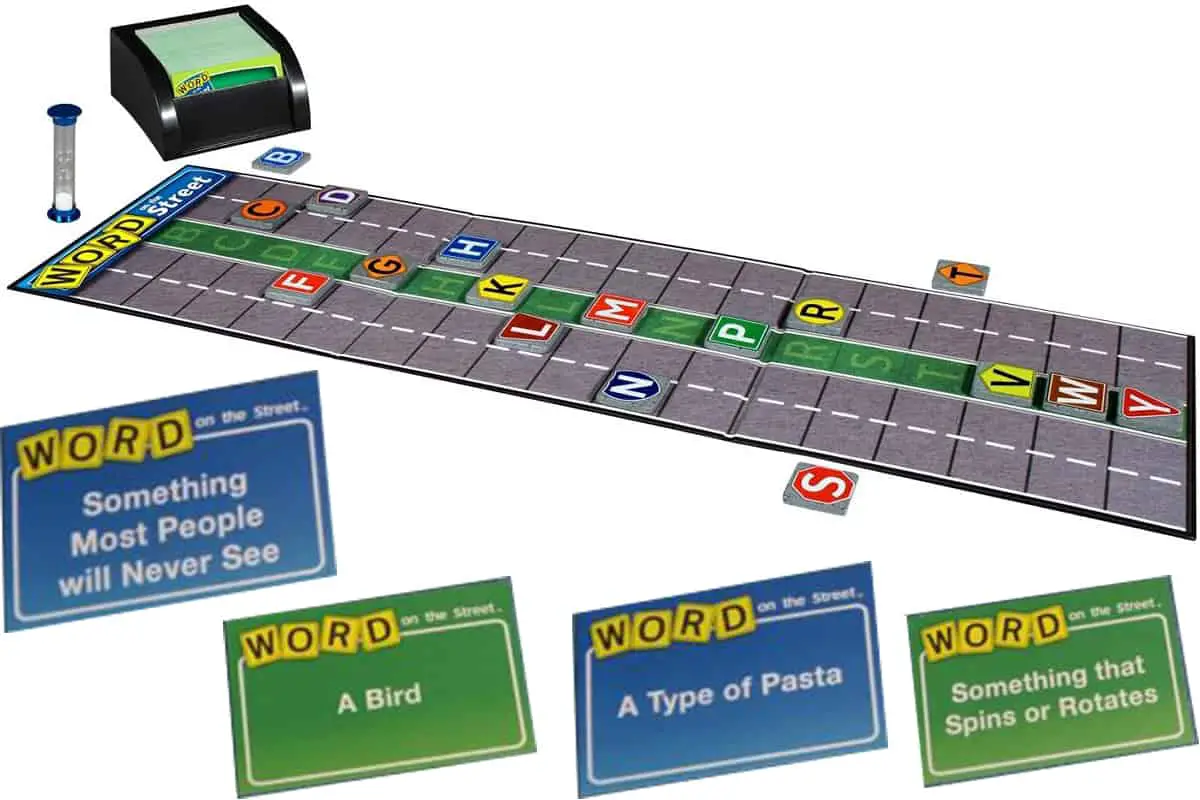
★★★☆☆
For Families | Age 12+ | 2-8 Players | 30 minutes
Word on the Street is played by two opposing teams composed of 1 to 4 players with:
- 17 letter tiles: there are no vowels and some consonants are missing like z,j and q
- 108 category cards: double-sided (hence 216 categories) and color-coded according to the level of difficulty (green for easy and blue for difficult)
The main goal is to capture eight letter tiles on the team’s side of the street and get them off the board. It is difficult because:
- Players must come up with the best word according to the available letters set on the gameboard
- The word must fit the category
- The word must be spelled aloud correctly as they move the letters to their side (one lane at a time)
- Opponents can sidetrack each other and recapture letters by using it in their turn (you cannot recapture the letters that are already off the gameboard)
The letters go back and forth on the gameboard in a tug of war fashion as teams take turns proposing words.
“Word on the Street” is effective for educational purposes because it enables to focus attention by selecting specific categories.
What is a little frustrating though:
- It is hard to spell a word that has with missing letters (confusing for beginners)
- A referee is needed to monitor scores and turns because teams may reject a word if it doesn’t fit the category.
Since the mechanics are a bit complex, I suggest children aged 8-12 years old to pair up with adults at first until they get used to the game.
Word on the Street Junior (Educational Insights)
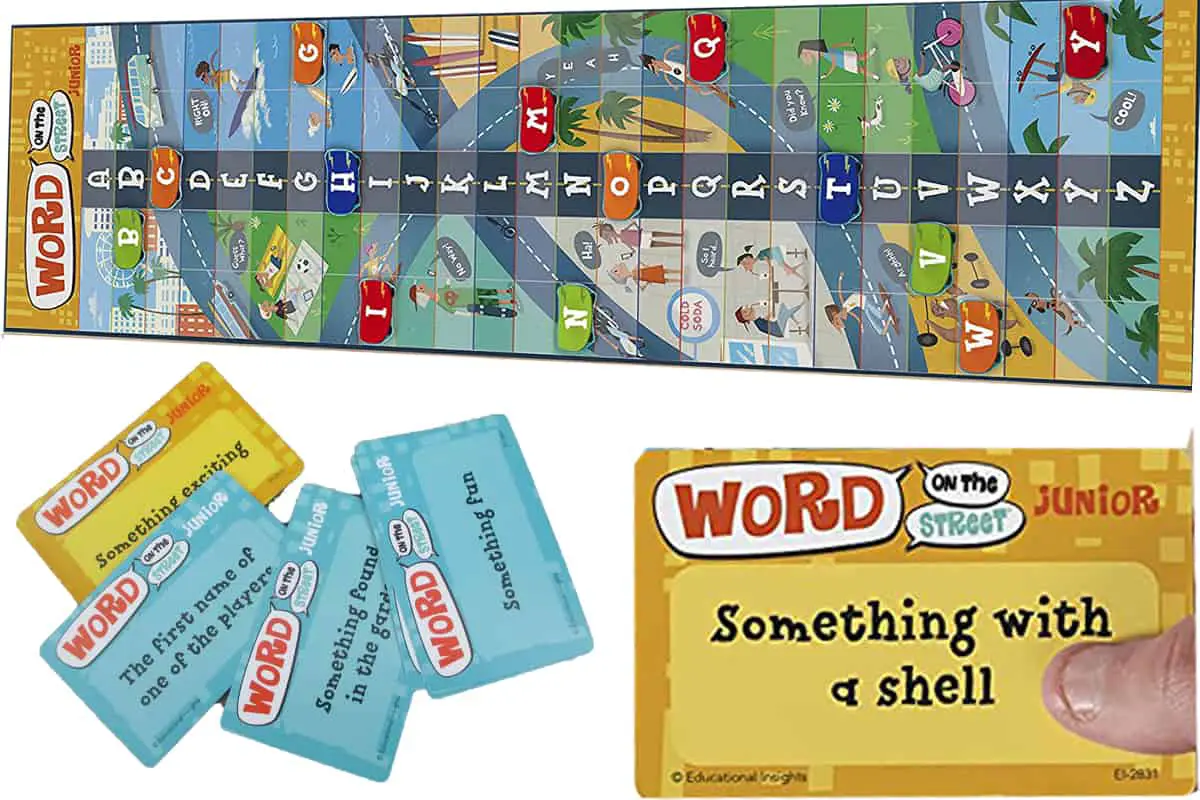
★★★☆☆
For Families | Age 8+ | 2-4 Players | 30 minutes
The rules of Word on the Street Junior
Lexogon (Tippecanoe Games)
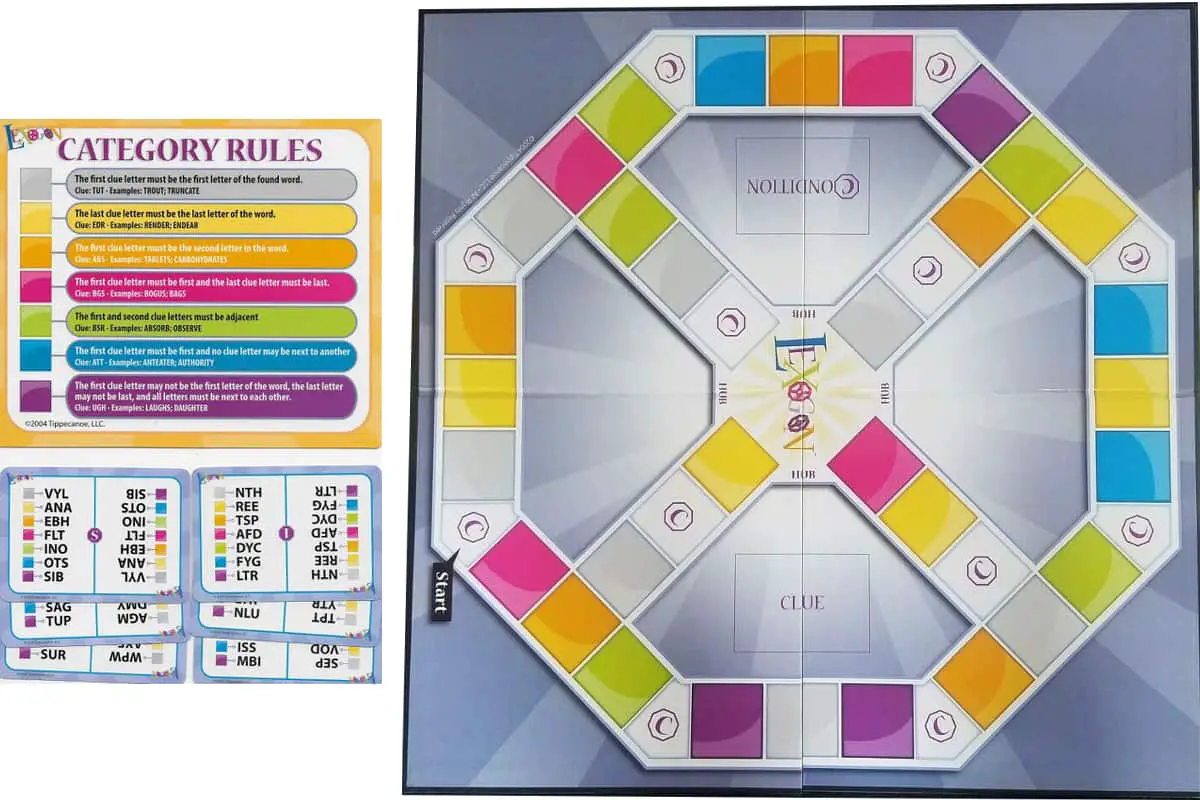
★★★☆☆
For Families | Age 12+ | 2-6 Players | 45 minutes
In Lexogon
This game contains
- 230 clue cards (115 standard which are for children & 115 intermediate recommended for adults), having each 7 color-coded three-letter clues.
- 67 condition Cards
- Two sand timers & Score Pads
Players :
- Roll the die and move their token by the number of spaces indicated by the die.
- If on a condition square on the board, draw a condition card and apply the rules given by this card
- Else, use the clue on your clue card that matches the color on your square, and the “category rule” for this color
- Find words that fits the targeted clue and rule (within 90 seconds).
Here are the pros and cons
- Younger players can use the “standard clue cards” while adults use the “intermediate clue cards”, making it possible for younger players to beat adults
- The condition cards create randomness in the game, making it possible for weaker players to win
- The 7 types of clues (and corresponding category rules) are confusing though. You might want to simplify them at first.
How Effective are Games in Vocabulary Acquisition?
Games offer repetition which is one of the most effective ways to learn new words.
Students need to be exposed to a new word five to sixteen times to acquire it. Playing vocabulary board games can increase that chance for a new word to make it into long-term memory.
Games maintain students’ motivation in vocabulary learning.
Students remember things faster and better when they are relaxed, interested, and entertained. All these factors can be found in playing vocabulary board games.
Edudingo.com is a participant in the Amazon Services LLC Associates Program, an affiliate advertising program designed to provide a means for sites to earn advertising fees by advertising and linking to Amazon.com. We also participate in other affiliate programs which compensate us for referring traffic.



















